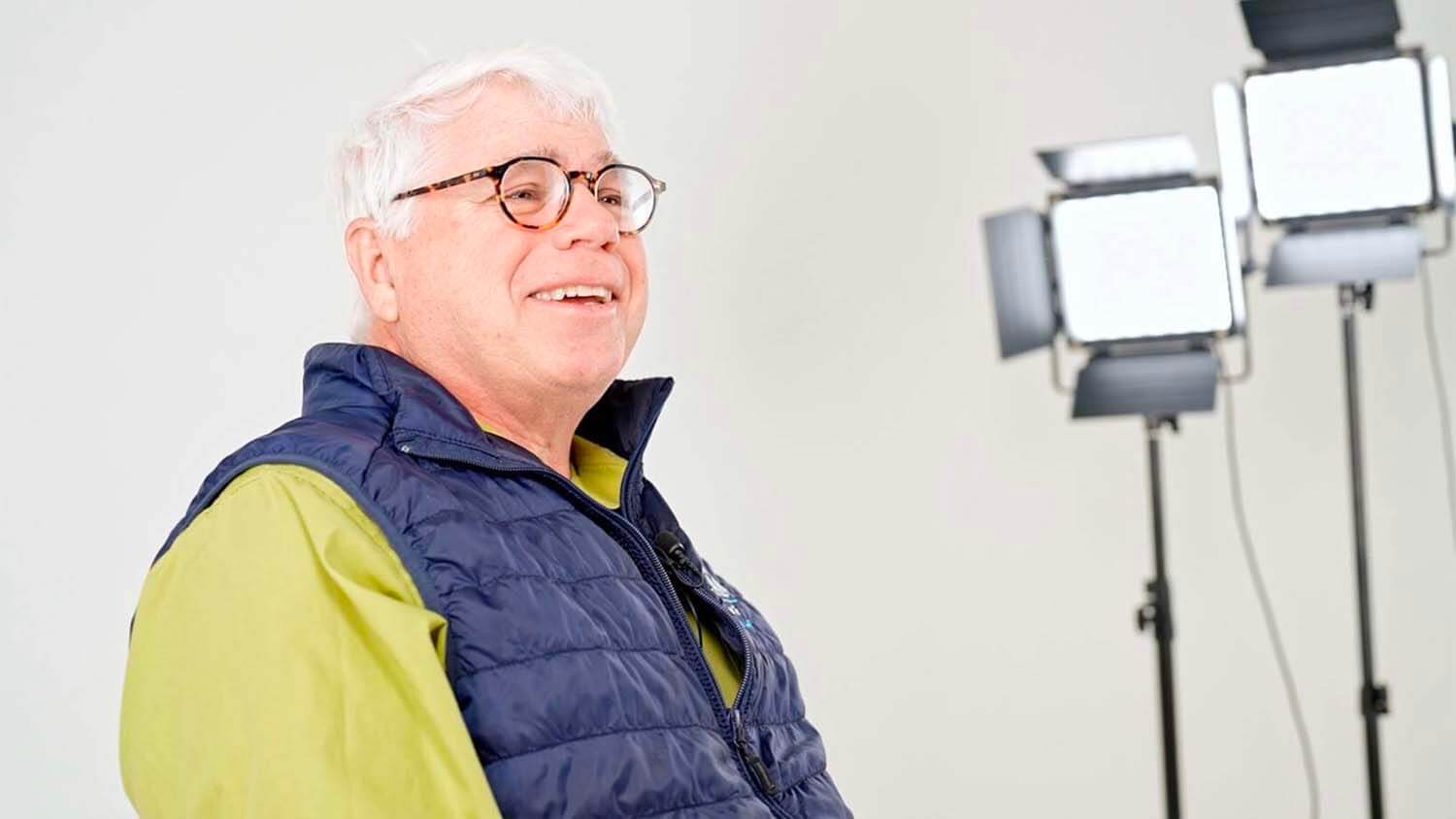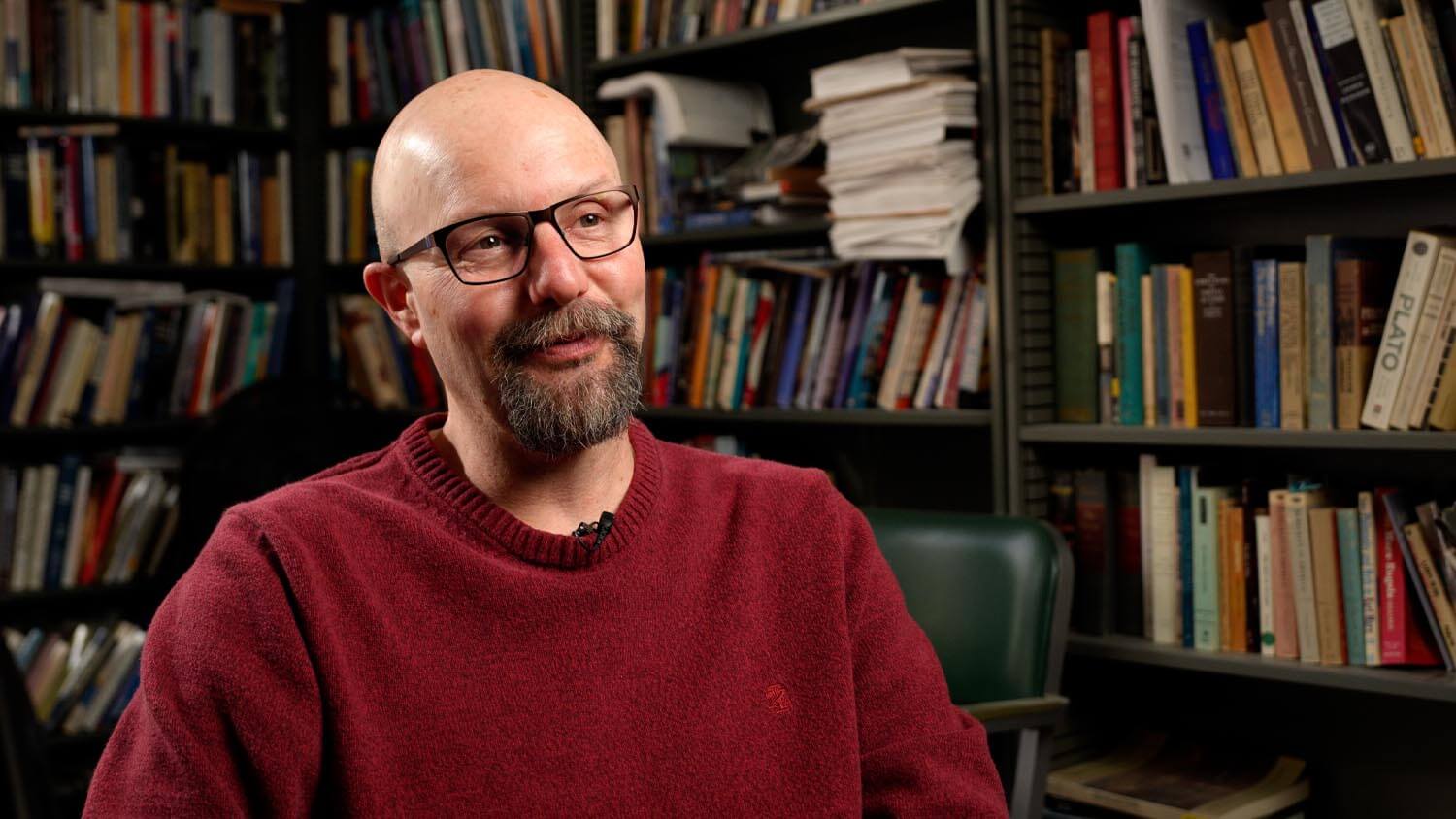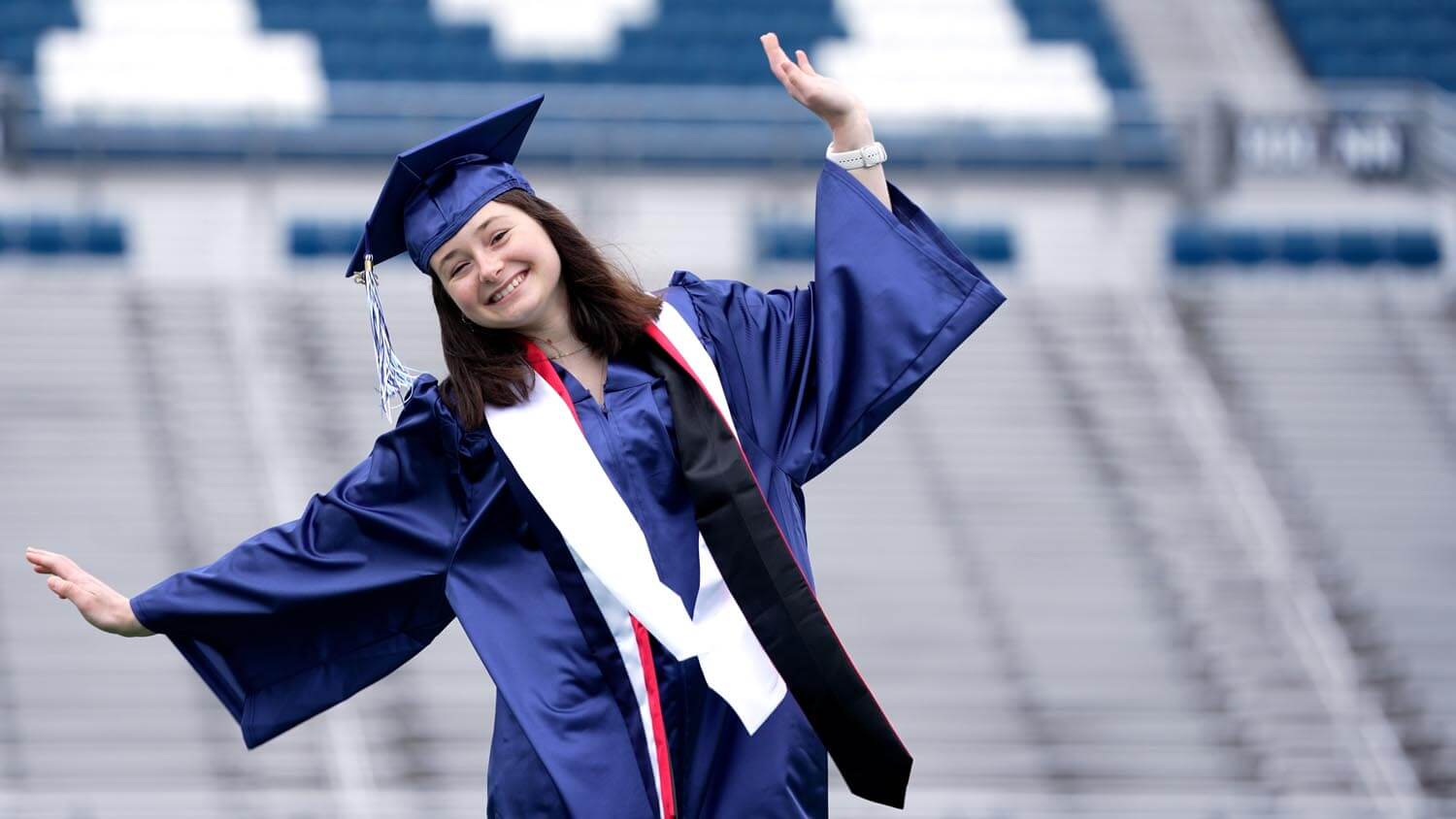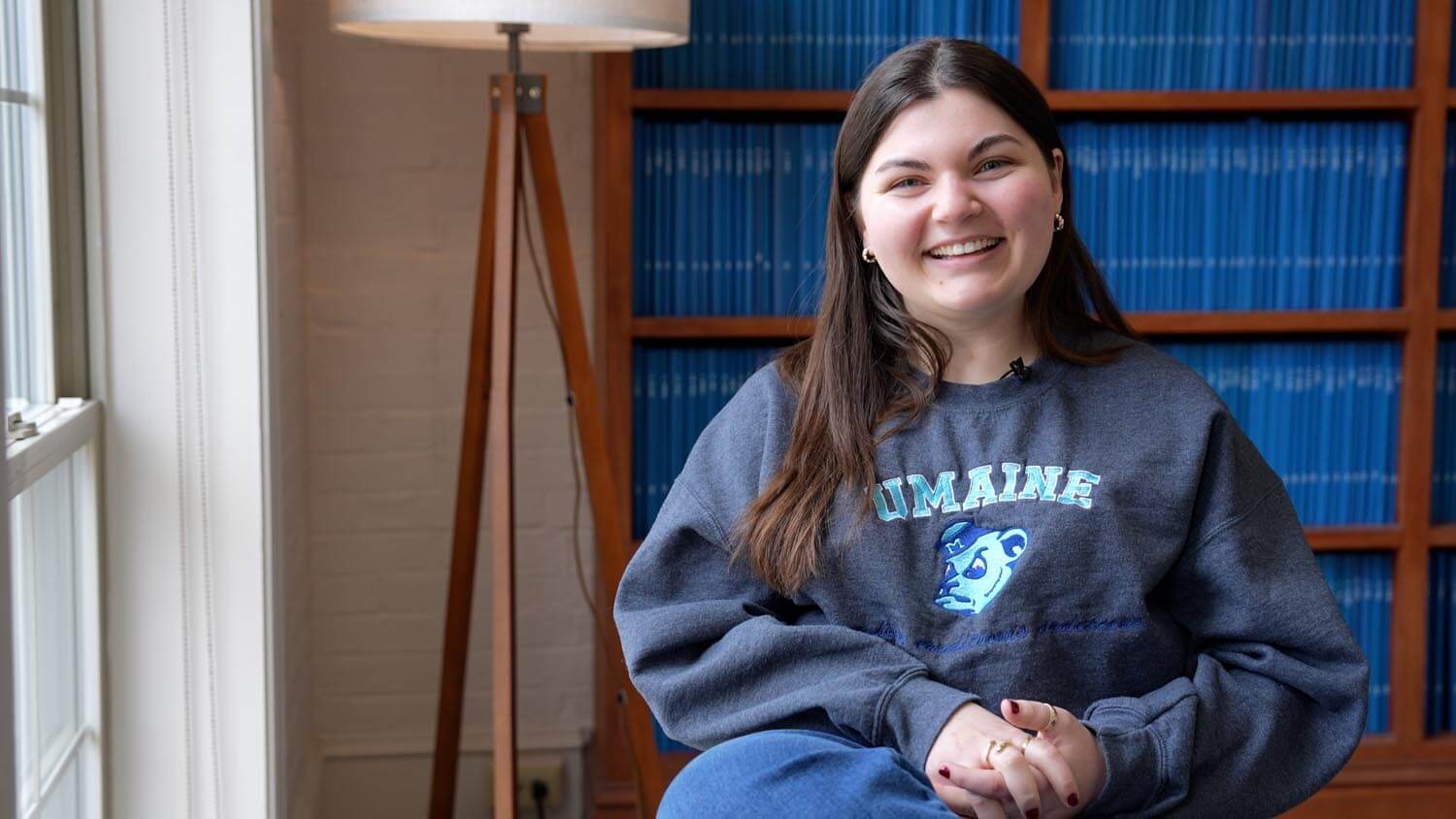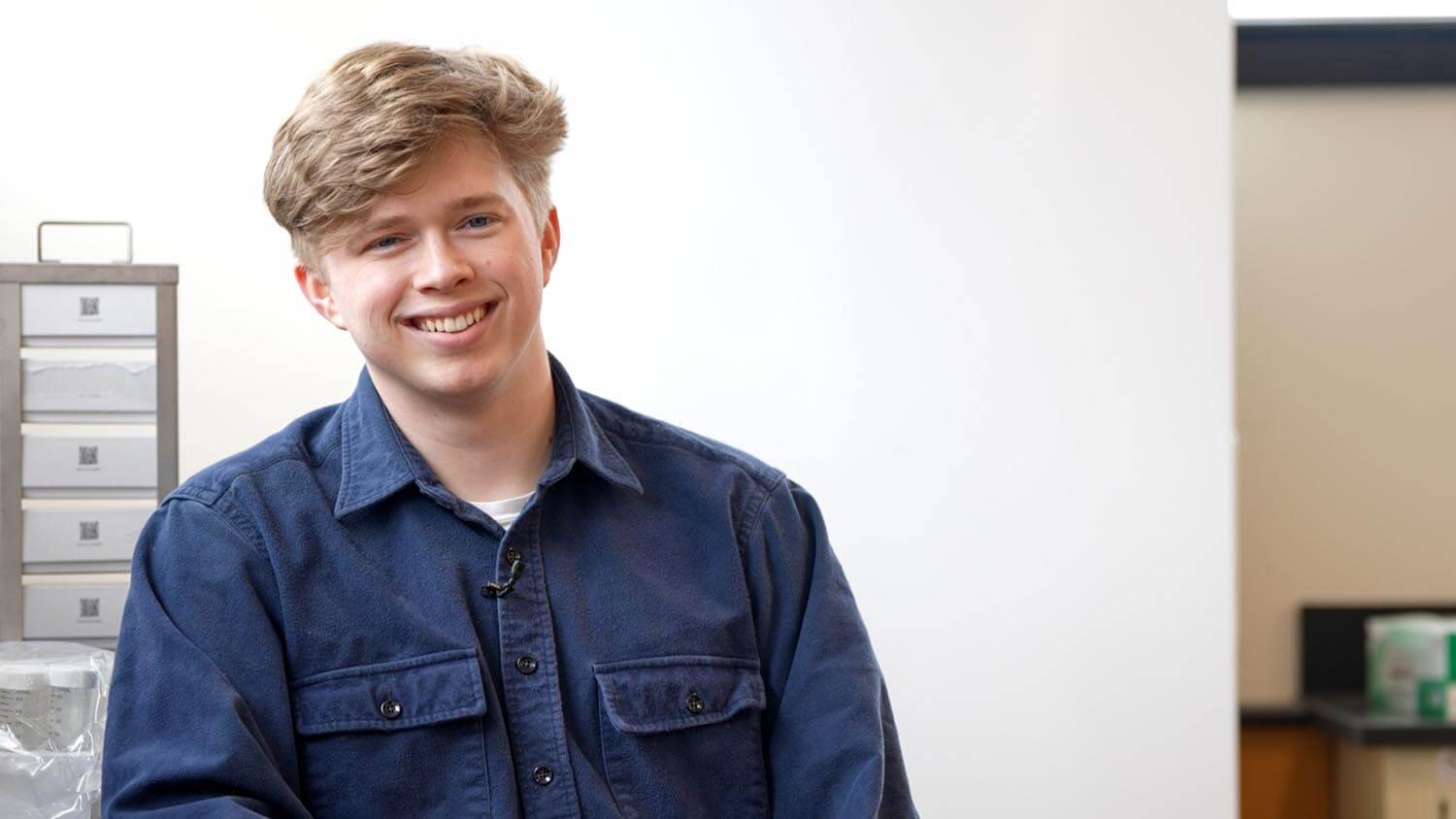
University of Maine
Commencement
May 2025
Jump to…
Graduate School Commencement Speaker
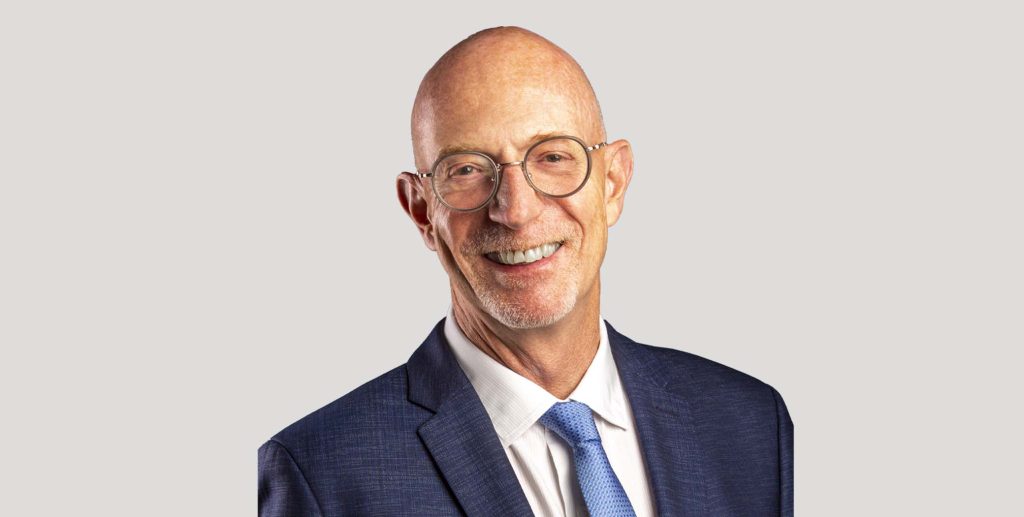
Graham Carr
President and Vice Chancellor | Professor of History at Concordia University
The president and vice chancellor of Concordia University, who more than 40 years ago received his Ph.D. from the University of Maine, will send off the graduate class of 2025. Graham Carr (‘83G) is the speaker for UMaine’s Graduate School commencement ceremony on May 10 at the Cross Insurance Center in Bangor.
Concordia is one of the top North American universities under 50 years old. Its two Montreal campuses are home to 50,000 students from more than 150 countries. Carr’s previous leadership positions at Concordia included provost and vice president of academic affairs; vice president of research and graduate studies; and dean of graduate studies.
“When Dr. Carr moved from his home in Canada to the University of Maine in 1979, he fully immersed himself in the cultural and historical study he was undertaking as a doctoral candidate. His dissertation shed light on how Canada’s geographical proximity to America shaped English-Canadian literary culture in the early 20th century,” said UMaine President Joan Ferrini-Mundy. “His desire to understand the driving force behind cultural development has served him well in his many leadership roles at Concordia University, situated in the multicultural city of Montreal. We are honored to welcome Dr. Carr to Maine for our Graduate School commencement ceremony.”
Born in Quebec, Carr earned a Ph.D. in history from UMaine. He is a professor in Concordia’s Department of History, alongside his leadership roles, and his ongoing research focuses on Cold War cultural history.
While at UMaine, Carr focused on both Canadian and American history, as well as Canadian-American relations and U.S. and Canadian literature. He said studying in a different country broadened his cultural and social horizons.
“I benefited from outstanding mentors and fellow students at the University of Maine, who encouraged my desire to work across disciplines and hone professional skills,” Carr said. “It’s an honor and privilege to return to the university and meet the next generation of graduates who have ambitions for success and to make a difference in the world. At a moment when the pace and impact of change has never been more accelerated or seismic, graduate education, regardless of one’s discipline or program of study, is a uniquely formative opportunity to develop advanced knowledge, skills and expertise.”
In addition to his tenure at Concordia, Carr is a member of the Board of the Chamber of Commerce of Metropolitan Montreal and the Montreal Climate Partnership (Partenariat Climat Montréal) steering committee. He also chairs the Universities Canada Research Committee and Board of Directors for U SPORTS, the national brand for university sports in Canada.
He has previously served in a leadership capacity for the Centraide (United Way) of Greater Montreal, the Leadership Council for Digital Infrastructure, the Canadian Federation for the Humanities and Social Sciences, the Canada-U.S. Fulbright Program selection committee and the National Capital Commission’s advisory committee for communications, marketing and programming.
Undergraduate Commencement Speaker
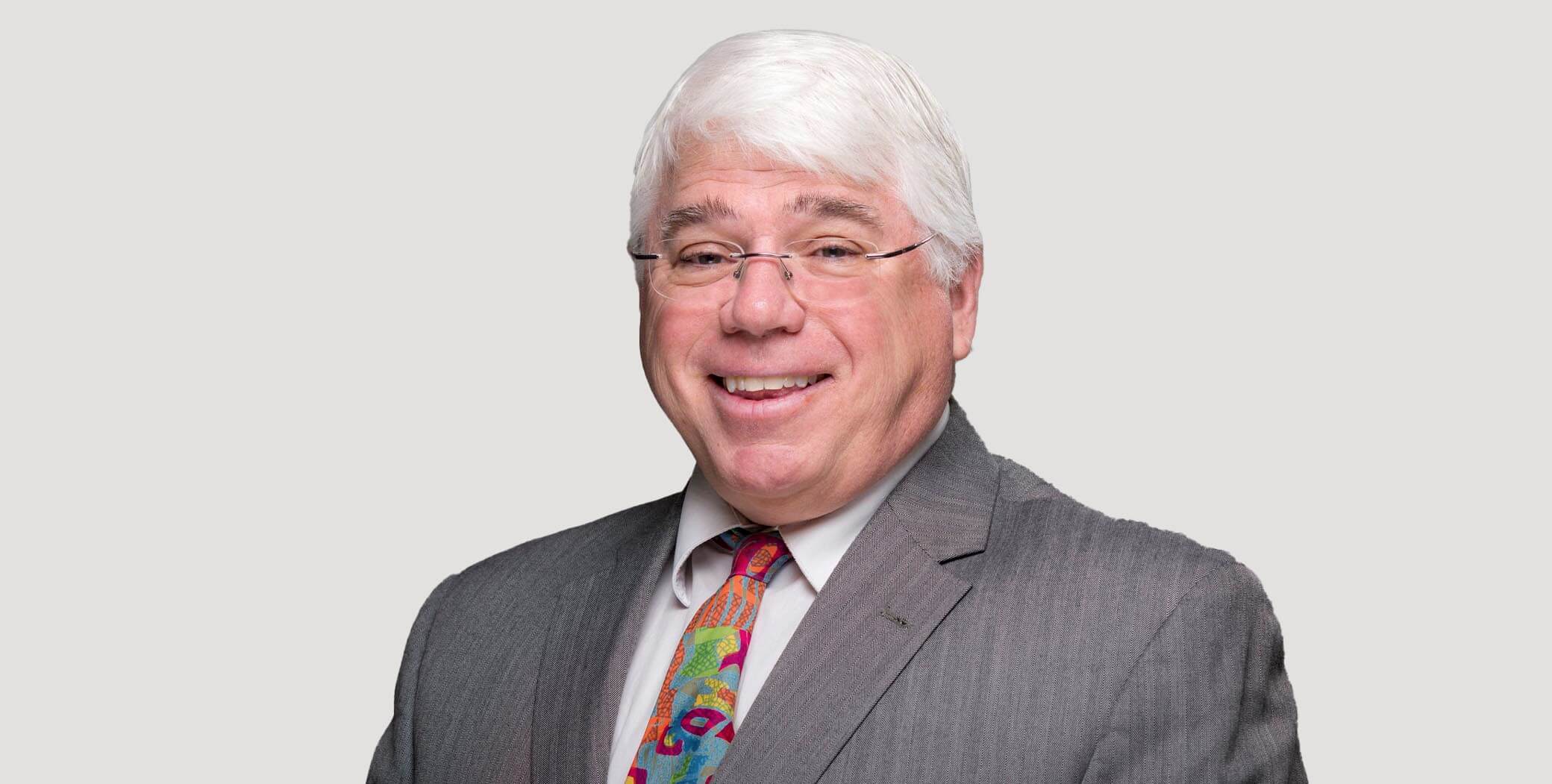
Robert Dana
Former Vice President for Student Life and Inclusive Excellence | Dean of Students, University of Maine
Robert Dana (’80) shaped the success of nearly half the students who have graduated from the University of Maine during its 160 year history. For a quarter of that time, he worked in support roles for student health and life. Five months into his retirement, Dana will send off the undergraduate class of 2025 during their commencement ceremonies on May 11 at the Cross Insurance Center in Bangor.
“Robert dedicated his career to creating a kind, caring and compassionate campus community where students could nurture their curiosity and pursue their new horizons. I’m honored he will be joining us at the 223rd commencement ceremonies,” said UMaine President Joan Ferrini-Mundy. “For 40 years, he celebrated the triumphs of all students and helped them navigate and learn from their differences.”
In 1985, Dana joined UMaine as the program coordinator for substance abuse services, and by 2002, he was promoted to dean of students, later adding vice president for student life and inclusive excellence to his title. Dana graduated from UMaine with a degree in psychology, received a master of education from Boston University and earned a doctorate in human development counseling from Vanderbilt University before returning to Maine.
He spent four decades at the university taking long walks through campus, snow or shine; responding to late night calls; and leading others to follow the golden rule like his mother taught him. Kindness, care and compassion were Dana’s three pillars for student success.
Residence life, multicultural student affairs, non-traditional and commuter student services, fraternity and sorority affairs, the UMaine Police Department, campus recreation, campus activities and veteran’s services were a few of the many programs Dana oversaw. He was responsible for student affairs fundraising; served on the Executive Cabinet and Provost’s Council; and has taught courses in the Graduate School and College of Education and Human Development.
Dana has been a member of the Association of American Colleges and Universities since 2005 and the Association of Public Land-Grant Universities: Council on Student Affairs since 2009. His recent addresses have included talks on leadership, service and free speech. He’s also an honorary member of the Alpha Phi Omega Service Organization and a distinguished member of the National Society of Collegiate Scholars.
“Robert’s legacy is defined by the profound impact he had on every University of Maine student during his remarkable 40-year tenure. He viewed each student as an individual, recognizing their unique contributions to our community,” said Andrea Gifford, interim dean of students. “I have always been — and continue to be — in awe of his ability to balance the demanding nature of his administrative responsibilities with a steadfast commitment to student well-being.”
Having grown up a middle child of six other siblings, Dana said he learned early on how to conciliate disputes and fix problems. For much of his career, he served as the primary advocate for students — whether that meant being lifted like a trophy in 1993 after winning the hockey championship or maintaining a sense of community during the isolation of the COVID-19 pandemic.
As about 1,800 undergraduate students prepare to leave UMaine, some to return and further their education, Dana will reflect on the memories they share and what his experiences have taught him about success and life. The class of 2025 will be the last Dana has watched step onto campus for the first time and leave with new friends, experiences and tools to build their careers.
“I was blessed to be filled with the joys and expectations of students while helping them transition their experience. Spending time every day with students was like fuel in my tank, and because of who students are and their enthusiasm, experiences and openness, no two days were ever alike,” Dana said. “It is a high honor and privilege to wish our graduates success and joy in all their endeavors.”
If he had the chance to do college over again, Dana said he would have pursued more varied classes and made more friends whose thoughts and experiences were different from his own. He believes curiosity and understanding are at the core of success. As dean of students, he worked to expand the comfort zone of every student — some whose classes were bigger than their hometowns — by teaching his three pillars: kindness, care and compassion.
“Be decent to people, try to observe from others’ perspectives and work to understand where and why someone is coming from a certain place,” Dana said. “Try not to take yourself too seriously. Remember: We are all people — perfect in our humanity and imperfection.”
In his retirement, Dana is continuing to diversify his experiences, learn new perspectives and live each day differently than the last. For his first of many travels, he and his wife spent six weeks in Italy.
It’s been me all along.
I’m Robert Dana, still, and I have been for a long time, and I’ve been at UMaine for a long time.
Somebody told me recently I’d been here for a quarter of the lifetime of the university.
I feel like, in some respects, I’m an old timer.
And in other respects, I feel just like I’m 18.
So, it’s a good time.
What is your favorite UMaine memory?
I have, it’s a funny memory.
It could be thought of as a negative thing, but we actually won a hockey championship in 1993, and I was called to the campus.
There were several hundred students having a very big bonfire.
I think they had just driven a snowmobile onto the bonfire.
I waded in like a damn fool into the crowd, and a football player picked me up.
I thought, “Oh my God, I’m going to be thrown on top of this fire.”
But he just picked me up and presented me to the crowd.
Big cheers.
I came down, I said, “well, let’s break it up.” And the party was over.
So, I remember that very fondly … especially when I arrived home.
I don’t know what that one means, I’ll have to move on.
So, the next question is, what was my favorite year at UMaine and why?
Well, just the nature of my life is that it’s constant, never ending change.
So, it wouldn’t be cliche for me to say that every year has been my favorite year because every year is completely different.
Every day, I see something I’ve never seen before.
And every year, I think, “Wow, that just zipped by.” So, after 40 years, I think, like, I’ve been here for, like, two hours or something.
What is your favorite curse word?
I use [inaudible] quite a bit, but, it’s just, you know.
How many laps have you walked in the indoor track at the Field House?
Well, I walk about four miles a day.
I’ve done that for at least the 40 years. I used to be able to run, but now I have to walk.
I have actually, in my idle time, computed how many miles I have run or walked in my life, and it pushes up into the 60 or 70,000 miles.
So, I love to walk because it makes me accessible.
I see a lot of people.
I get to feel the vibe of the campus.
And I know it’s been a distraction to a lot of people, but I call a lot of people and complain about things that don’t look just right.
So I want the place to sort of perk in a good way.
Will you be my grandpa?
Yeah, I guess.
I get a lot of students who, you know, I think they just want to be cared for.
And, you know, I know that the way I look and just sort of my presence on campus, people see me and they think they have a real connection to me.
And I hope they feel that, and I hope they do.
So, yeah, I will be. I’ll be anybody ‘s stand-in.
How do you remember so many names?
My kids kid me, and they say, “Well, if I don’t really remember a name, I’ll say, ‘Hey! How are you doing?’”
But I do try to remember names because, again, it gives people a sense that they matter.
And I do have a big thing about mattering.
Any parting thoughts or words of wisdom?
I hope that everybody gets the experience I had.
I do like something called the golden rule, right?
Be decent to people.
So, don’t take ourselves too seriously.
And remember that the sun is shining down on us.
Yeah, open your arms to it.
Can we take a selfie?
I would love for us to get a selfie with you.
Yeah, okay, good.
Thank you so much.
Thank you very much.
Thanks, bud. Thanks. That was good. Thanks.
Honorary Degree Recipient
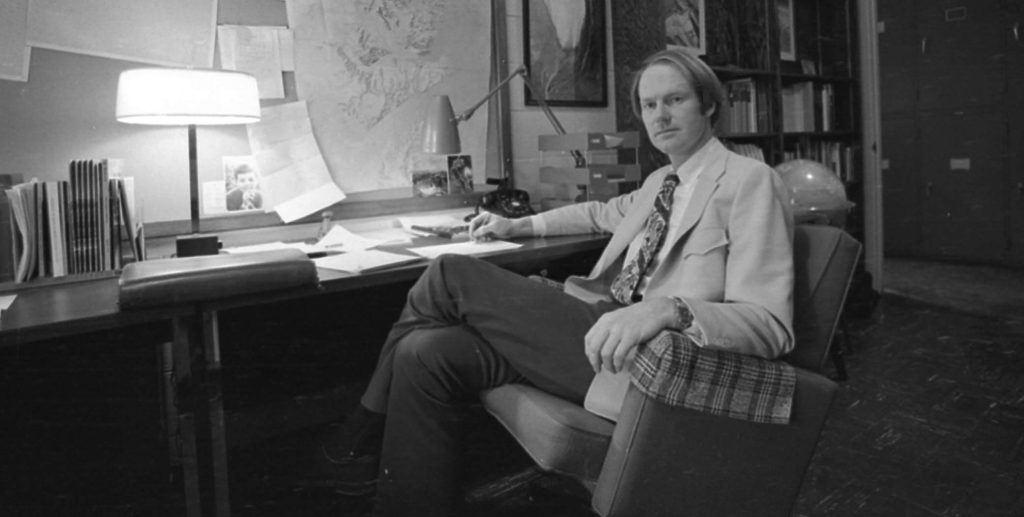
George Denton
Libra Professor of Geological Studies, University of Maine
The University of Maine will confer an Honorary Doctorate of Humane Letters to George H. Denton, a multi-generational leader in glacial research and climate science education, during its morning undergraduate commencement ceremony on May 11.
“No one is more deserving of this year’s honorary doctorate than our very own George Denton. He has been a valuable asset to the School of Earth and Climate Sciences since he helped establish what is now known as the Climate Change Institute in 1973,” said UMaine President Joan Ferrini-Mundy. “His expertise in the temporal and geological study of glaciers has inspired many young climate scientists in Maine and beyond, and his groundbreaking research has laid the framework that helps us all understand the changes happening to our planet.”
Since he began his career in the 1960s, Denton’s environmental research has been cited more than 29,000 times. He has traveled to Antartica more than 30 times and has two landmarks named in his honor: the Denton Hills and the Denton Glacier.
With Denton’s participation, the Climate Change Institute, first established as the Institute for Quaternary Studies, investigated climate change — a phenomenon that Denton has spent half a century studying in relation to glaciers. He was the director of the institute for four years. A graduate of Yale University’s master’s and doctoral program in geology, Denton focuses on the geological history of large ice sheets and smaller mountain glaciers. The only aspect of his career that Denton values more than research has been inspiring generations of climate students. He is a proponent of student-led research, which has resulted in his students becoming faculty members at universities in the U.S. and Europe.
In 2002, Denton was elected as a member of the U.S. National Academy of the Sciences. He was previously elected as a member of the Royal Swedish Academy of Sciences in 1996. He received the Vega Medal from the Swedish Society for Anthropology and Geography in 1990 for his studies in physical geography and a Distinguished Career Award from the Geological Society of America in 2015.
Distinguished Maine Professor

Mark Brewer
Professor of Political Science | Chair of the Department of Political Science
A world-renowned political scientist, transformative educator and tireless servant to his institution and community has been named the 2025 Distinguished Maine Professor, the University of Maine’s most prestigious faculty accolade.
Mark Brewer, professor and chair of the Department of Political Science, was honored at the Alumni Achievement Awards Dinner and Celebration, alongside other alumni award honorees, on Friday, May 2 at Wells Conference Center.
The annual Distinguished Maine Professor Award honors a UMaine professor who exemplifies the highest qualities of teaching, research and public service. It is sponsored by the UMaine classes of 1942 and 2002, and administered by the University of Maine Alumni Association.
“I am incredibly honored to receive this award,” Brewer said. “I am humbled to join such a distinguished group of colleagues.”
Since joining UMaine’s faculty in 2004, Brewer has earned a reputation as a go-to political expert who delivers timely, accessible, knowledgeable and non-partisan insight on issues in Maine and the U.S.
Across more than 1,500 interviews with reporters from local, national and international news organizations, Brewer has offered analyses on congressional races, ranked-choice voting, policy issues, partisanship, polarization and other topics. The New York Times, the Washington Post, the Associated Press, USA Today and NPR are among the many outlets that have featured him, and he has served as a campaign analyst for PolitiFact.
As a scholar of political behavior, Brewer has also shared his expertise through two textbooks, six other books and dozens of peer-reviewed journal articles, chapters and reviews. One textbook, “Parties and Elections in America,” which Brewer co-authored with L. Sandy Maisel, is now in its 10th edition and is the best-selling textbook on this topic in the political science field.
Beyond his own writing, Brewer has elevated and guided academic discourse in his field as the editor-in-chief of the New England Journal of Political Science, an Academic Advisory Board member for Civic Pulse and a manuscript reviewer for more than two dozen other journals. He has also served as a member of the American Political Science Association and four regional affiliates.
“Dr. Brewer is one of the most accomplished scholars in the world in the field of American political parties and elections,” said Richard Powell, John Mitchell Nickerson Professor of Political Science and director of the William S. Cohen Institute for Leadership & Public Service.
As an educator, Brewer has taught 16 different undergraduate courses ranging from “Introduction to American Government” to “Senior Seminar in Political Science.” Each academic year, he advises 40-60 students. He has also served as a core faculty member of the Honors College — having taught its first-year seminar throughout the majority of his career and advised or co-advised 17 thesis students — as well as the Leadership Studies Program, through which he teaches 200- or 300-level courses each year.
“Professor Brewer’s students describe him as ‘electric,’ ‘one of the best academic instructors I have met.’ They praise his ability to foster an environment of respect and to engage the entire class in discussing difficult topics,” said Emily Haddad, dean of the College of Liberal Arts and Sciences. “The student letters in the nomination packet speak to Dr. Brewer’s impressive pedagogical skills and his lasting influence on students’ lives.”
Outside of the classroom, Brewer has molded students’ experiences through various leadership and supportive roles, including as chair and interim chair of the Department of Political Science, lead faculty member for the political science online major and minor, co-pre-law advisor, Legal Studies minor advisor, faculty representative for the 3+3 program between UMaine and the University of Maine School of Law, advisor for the Madison Fellowship and Truman scholarships and advisor of the political science honor society: Pi Sigma Alpha.
Brewer has also committed himself to elevating the College of Liberal Arts and Sciences and university at large as a member of the college’s First Year Student Success and Retention Committee and Promotion and Tenure Advisory, the Honors College Faculty Advisory Council, the University Research Council, the New England Commission of Higher Education Self-Study Writing Team, the Strategic Re-Envisioning Working Group on Enhancing Academic Programs and in numerous search committees. He has also co-directed the Judaic Studies Program and served as a member of its advisory council.
Additionally, Brewer has dedicated himself to civic service as a member of the Regional School Unit (RSU) 26 Board of Directors in Orono and the Town of Orono Board of Elections.
For his altruism, scholarship and talents as an educator, Brewer received several other awards over the years, including the Faculty Excellence Award from the UMaine Alumni Association and two Outstanding Faculty Awards from the College of Liberal Arts and Sciences in 2014 and 2019.
“Dr. Mark Brewer is exactly the sort of faculty member the Distinguished Maine Professor Award was created to honor. It is incredibly rare for a faculty member to be truly elite in all three areas of teaching, scholarship and service,” said Powell, 2020 Distinguished Maine Professor.
[background music]
Mark Brewer: There is going to be a vote sometime today, even though he admitted at this point, they don’t have the votes to pass this.
Elle Prescott: Mark Brewer is an incredible professor, and I’m so lucky to have met him in my time here at UMaine.
Mark: My name is Mark Brewer. I’m professor and chair of the Department of Political Science here at the University of Maine. I have been at the University of Maine since the fall of 2004.
Rich Powell: Mark is a passionate and inspirational teacher. In fact, students will regularly say that he had an impact on their lives that really transformed what they were planning to do with their careers.
Elle: I transferred in my second year of undergrad and was really struggling to get the lay of the land and figure out where my place was here at UMaine. Mark Brewer did an incredible job of making me feel so comfortable and right at home in the poli sci department.
Mark: When students first arrive, I don’t care who they are or what their experience is. They’re a little bit nervous. I think it’s our job as a campus community to make them feel welcome, to give them the message, “Hey, there’s a spot here for you.”
Rich: Mark’s teaching doesn’t just inform students. It does do that, but more than anything, he makes American politics interesting so that they are motivated to participate as citizens.
Elle: He is so passionate about what he teaches. He really tries to incite that in students through the different projects you do, through the different papers you do. He cares about the feedback that he’s giving on everything. He wants you to work harder, and he wants you to do better.
Mark: I’m excited when I walk in the classroom, and I think they can tell that I’m excited. At least some of them get excited back, and I feed off of that, and then they feed off of me. I love the exchange of ideas with students. In those instances where I can just get a glimpse of something I remember that we did in class, or in a meeting in my office, or an assignment I gave manifesting itself in something that they’re doing later in life, that’s pretty rewarding for me.
Rich: Mark is the go-to expert for commentary in the news media on Maine politics and many aspects of national politics. Mark: The mission of a public land grant institution and the kind of students that we get here at the University of Maine fit all the things that I think are great about higher ed. I’m very honored to have been selected, and I’ll continue to be honored to have been selected.
[music]
Presidential Awardees
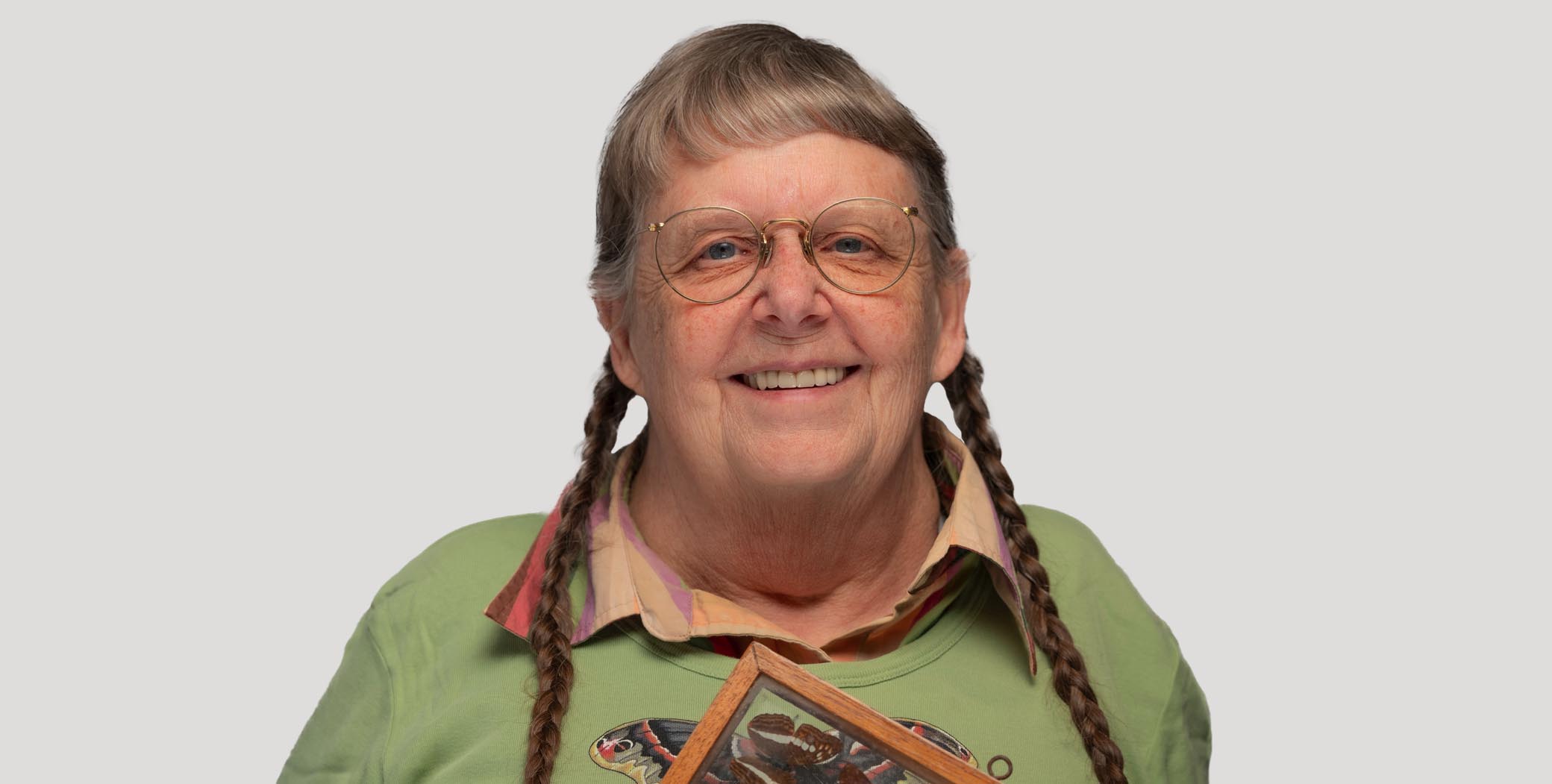
Outstanding Teaching
Gayle Kraus
Professor of Marine Ecology, University of Maine at Machias
Throughout Gayle Kraus’s 44 years of teaching marine biology courses, her love for it has never waned. She is just as excited about teaching today as she was at the beginning of her career. She has changed the lives of many, not only in the classroom, but also as an adviser and mentor.
Kraus significantly enhances her students’ educational experiences by designing coursework that gives them an opportunity to be on the sea and along the coast. Her use of immersive field experiences deepen student understanding by connecting classroom learning to real-world application. With an expertise that spans the topics of ichthyology, marine biology, marine mammals, invertebrates, ornithology, skeletal articulation and wildlife rehabilitation, Kraus has a personal way of connecting those around her with knowledge. She teaches others to imagine the world as she does: through the eyes of the subject, whether that be a New Zealand abalone shell or a harbor seal.
During the fall, spring and summer, Kraus works with students to create and maintain the aquaculture laboratory, where they are tasked with nurturing a healthy ecosystem in fish tanks, and the campus labyrinths, which are creative pathways for people to explore made of logs, flowers and other natural elements. For over two decades, she and her students have participated in the Marine Mammal Stranding Network to collect and assess data on the carcasses of marine animals such as seals, sharks and whales, as well as rescue and perform basic triage on a variety of seal species. She also helps students set up research aquariums for culturing corals, a skill needed to restore reefs that provide habitats for endangered marine species.
Throughout her career, Kraus’s research on marine ecosystems — from soft shell clams to macrobenthic organisms — has been included in over a dozen abstracts and publications.
Her advice to future teachers is to not be afraid of extending beyond the comfort zone and learn along with students, which is when Kraus said the adventures start. She strives to keep her courses experiential, ever changing and relevant so that her students are always entertained.
Kraus was recognized by Commissioner Judy Camuso of the Maine Department of Inland Fisheries & Wildlife in 2021 for her volunteer work to stabilize and rehabilitate injured birds and mammals. She has been a Maine state permitted wildlife rehabilitator for approximately 30 years and participates annually in the Audubon Christmas Bird Count.
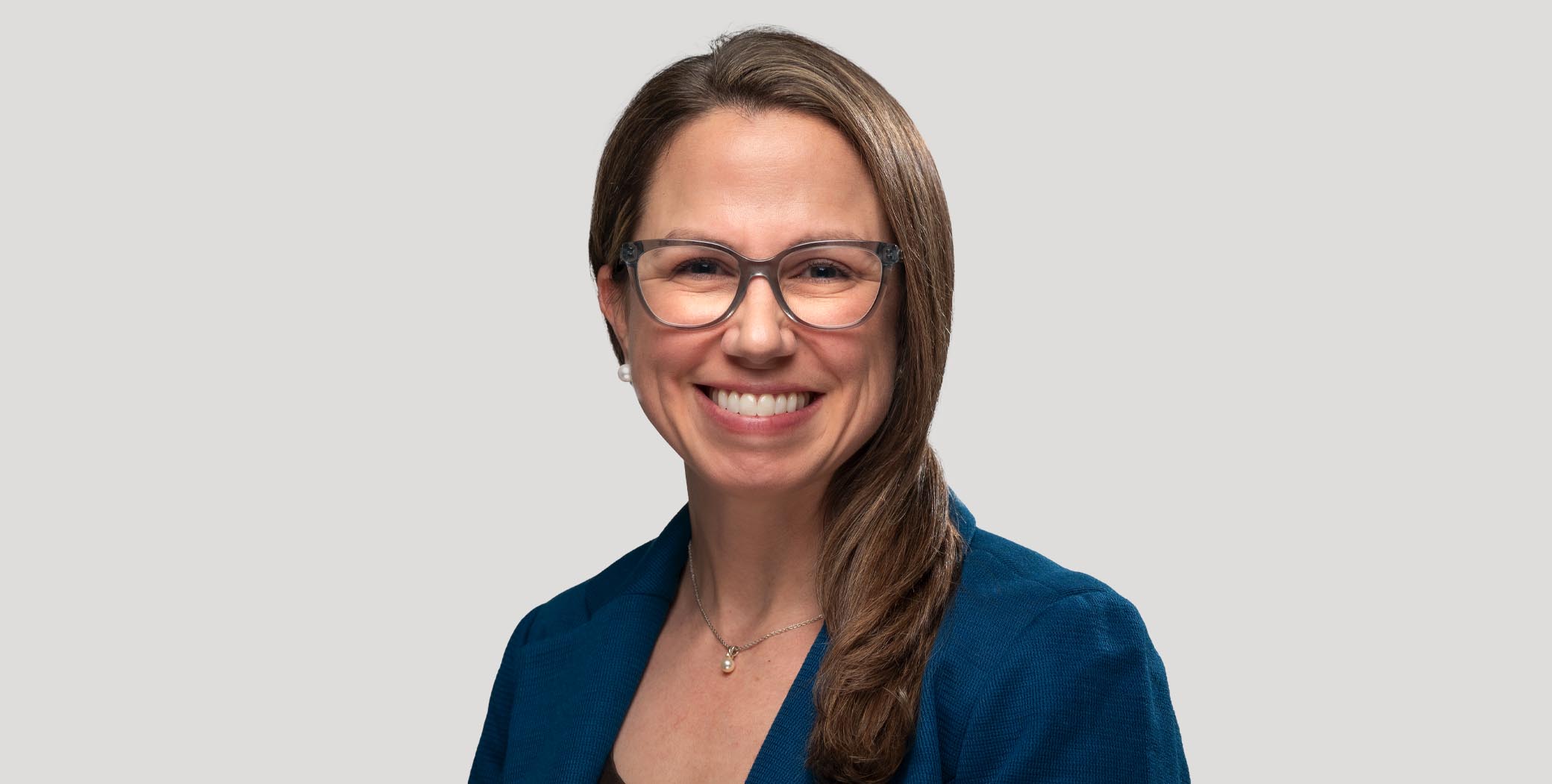
Outstanding Teaching
Melissa Maginnis
Associate Professor of Microbiology
Melissa Maginnis has dedicated her career to understanding the complexities of viral disease and training the next generation of biomedical scientists. As associate professor of microbiology, Maginnis leads both undergraduate and graduate students in research and learning and has mentored and advised students through the Maine Top Scholars program and Health Professions Advisory Committee.
Maginnis joined the Department of Molecular and Biomedical Sciences in 2014 and has established herself as an expert in the field of virology. She leveraged her talents to help Maine’s public universities navigate the COVID-19 pandemic as the scientific lead for the University of Maine System Science Advisory Board. Her work earned her recognition through national media appearances, including on Jimmy Kimmel Live! and in The Wall Street Journal.
As co-chair of the American Society for Virology (ASV) Education and Career Development Committee, Maginnis collaboratively led the creation of the first ever curriculum guidelines for undergraduate and graduate virology education. She applied that knowledge at UMaine by redesigning an upper level virology course, designing a new course for graduate students and developing a research intensive virology course for undergraduates. The latter was selected as one of the first Advanced Research Learning Experience courses as part of UMS TRANSFORMS, a program funded through generous support from the Harold Alfond Foundation.
Maginnis’s breadth as an educator is exemplified through her ability to teach both advanced and beginner courses, such as the widely popular “Phage Genome Discovery” course for first-year students. Despite the challenging nature of her subject matter, students find Maginnis’s classes to be fun and interactive as she promotes student agency and teaches them the values of thinking critically and self critiquing their own work.
In addition to the more than $3 million in grant funding she has secured from sources including the National Institutes of Health, her mentorship has helped students secure funding for their own research proposals. She has trained over 30 undergraduate students, eight Ph.D. students and three master’s students and has served on more than 60 thesis committees.
Maginnis reaches prospective students by serving on the Office of Major Scholarships Advisory Council and at the Maine State Science Fair as a scholarship judge. She is the faculty advisor for Undergraduate Women in STEMM and partners with the women’s soccer head coach, Scott Atherley, to support the recruitment of female student athletes.
She received the 2024 Graduate Faculty Mentor Award and the 2018 Graduate Mentor Award from the Graduate Student Government; the 2024 Mel McClure Global Community Impact Award from the Office of International Programs; and the 2022 Faculty Mentor Impact Award from the Office of the Vice President for Research.
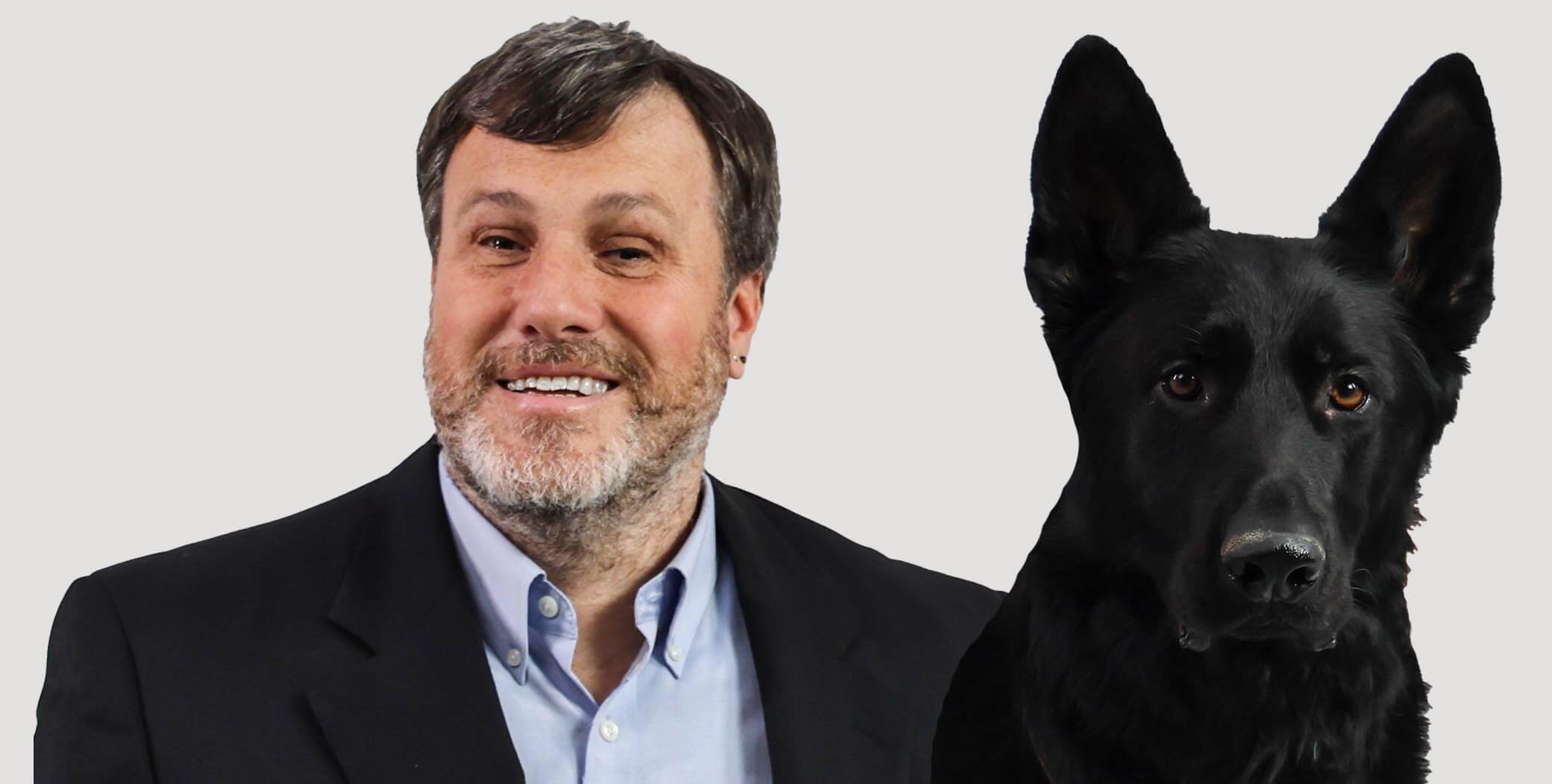
Research and Creative Achievement
Nicholas Giudice
Professor of Spacial Computing | VEMI Lab Founder and Chief Research Scientist
For Nick Giudice, research impact and translation are paramount. Since joining the University of Maine in 2008, he has focused his work on improving the independence and quality of life for millions of people worldwide who are blind and low vision (BLV), including older adults, as vision loss is predominantly age related. Giudice himself is congenitally blind and has pioneered tools, technologies and techniques to promote information access for BLV individuals in multiple disciplines including spatial cognition, transportation and STEM education.
Giudice is a professor of spatial computing in the School of Computing and Information Science and the chief research scientist of UMaine’s Virtual Environment and Multimodal Interaction (VEMI) Laboratory. He founded and has developed the VEMI Lab, alongside its director Rick Corey, to a multidisciplinary and student-driven research hub home to a first-of-its-kind full motion, multi-person autonomous vehicle simulator used to study human-vehicle collaboration.
Giudice’s research program combines approaches from experimental psychology, cognitive neuroscience and human-computer interaction to study how the brain fuses spatial information from multiple senses — audition, language, touch and vision — to support spatial learning and behavior. His work has motivated new theories about how nonvisual and multisensory information is represented in the brain and led to the development of universally designed multisensory tools that support graphical access, navigation and autonomous transportation.
Giudice’s research group also has established multisensory techniques to promote human-vehicle collaboration with autonomous vehicles, aiming to make the human-AI interactions needed for this emerging form of transportation universally accessible and intuitive. This groundbreaking research led to a U.S. Department of Transportation design award and an invitation to visit the White House in 2022.
Giudice has authored or co-authored more than 150 scientific publications relating to the study and design of multisensory information access technology. He has also been the principal investigator or co-principal investigator on more than $17 million in research grants and awards from the National Institutes of Health, the National Science Foundation and the U.S. Department of Transportation. He frequently collaborates with industry partners on research to support universal design.
Giudice has served on the program committees of dozens of scientific conferences and workshops and the scientific advisory boards of two information access companies. He sits on the Board of Directors of The Iris Network, a nonprofit that serves the BLV community. In 2017, he co-founded Unar Labs LLC, a Maine-based start-up company pioneering information access technologies.
Giudice received the 2023 Outstanding Faculty Award for Research and Creative Achievement from UMaine’s College of Liberal Arts and Sciences and UMaine’s 2019 Faculty Mentor Impact Award.
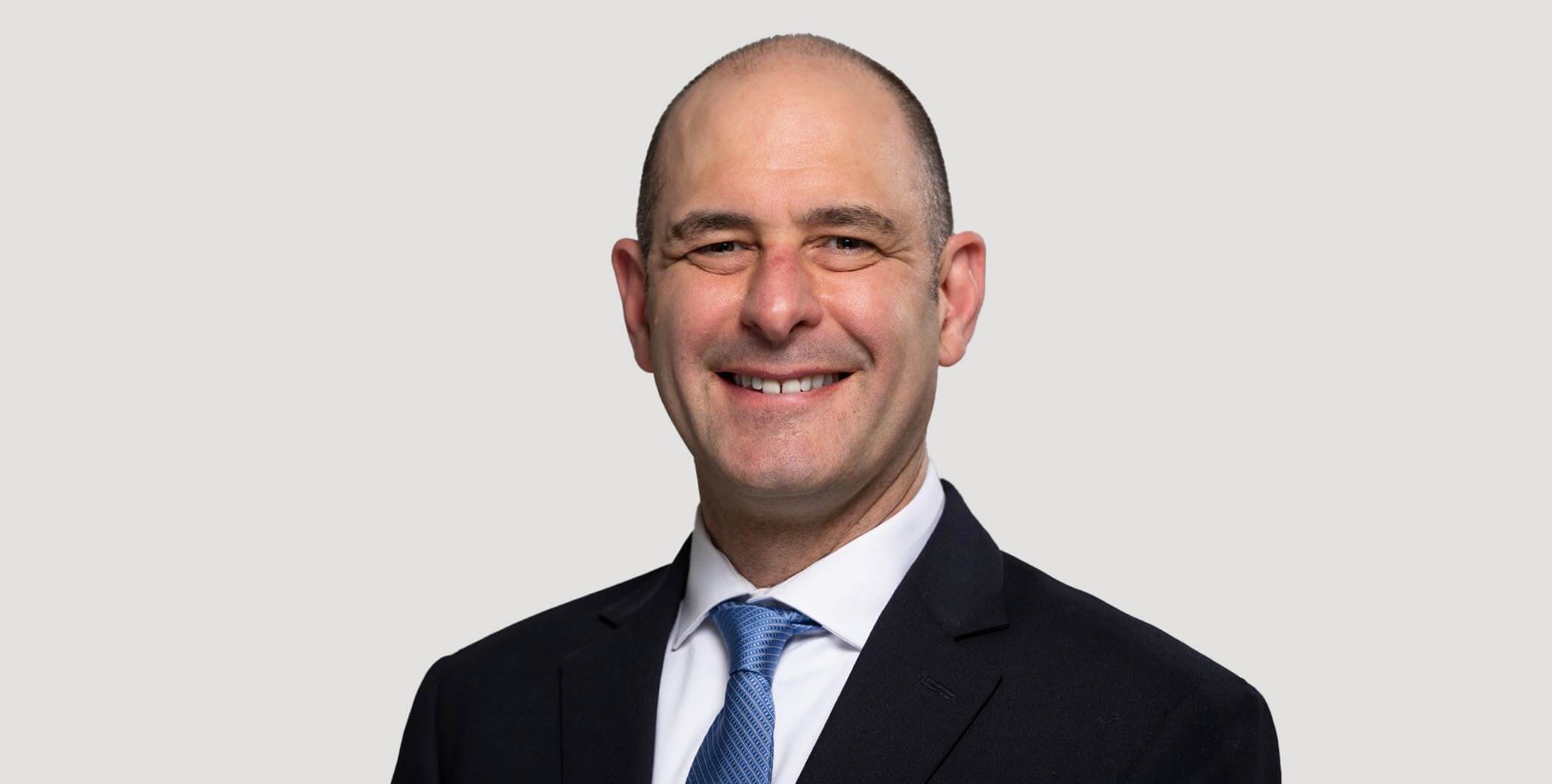
Public Engagement Achievement
Ryder Scott
Executive Director of UMaine 4-H Centers
Ryder Scott has dedicated his professional career to the growth and development of Maine’s youth. Scott joined University of Maine Cooperative Extension in 2007 as the program director for the UMaine 4-H Camp & Learning Center at Bryant Pond . Today, he provides statewide leadership as the executive director of the 4-H Learning Centers, which include Blueberry Cove, Tanglewood, Greenland Point and Bryant Pond. He plays a pivotal role in transforming outdoor education and youth development across the state.
Under Scott’s leadership, these 4-H sites have evolved from summer camps to year-round learning centers that prioritize experiential education, foster a deep connection with the natural world and help young people reach their fullest potential. Through the year-round program offerings at the 4-H Centers, thousands of young people have gained invaluable skills in leadership, conservation and stewardship. In an era when technology can lead to a “nature deficit” in youth, Scott and the programs he leads ensure that students have an opportunity to engage in immersive outdoor experiences that promote problem-solving, teamwork and personal growth.
A defining characteristic of Scott’s work is his conviction to the idea that exposing youth to experiential learning opportunities in the outdoors is essential and should be universally accessible. Through scholarship programs, community partnerships and innovative programming, he has worked to ensure that children from all of Maine’s communities have the opportunity to experience the benefits of outdoor learning. In service of this goal, Scott has cultivated strong collaborations with educators, nonprofit organizations, state agencies, philanthropic entities and policymakers.
He was instrumental in creating the Telstar Freshman Academy, a partnership between MSAD 44 and the Bryant Pond 4-H Center. This unique approach to high school education at the Bryant Pond 4-H Center combines interdisciplinary, project-based curriculum with best practices in experiential and outdoor learning to create a vibrant, engaging environment for all district ninth graders.
Scott also helped launch the NorthStar 4-H Youth Mentoring program in Oxford County. Through long-term mentorship support from adults, the program aims to raise college and career aspirations for youth from rural Maine communities. Since its inception in 2017, the program has expanded beyond its pilot site to two additional school districts serving hundreds of youth.
As a recognized leader in outdoor education across the state, Scott has been instrumental in building a coalition of outdoor education organizations to form the Maine Outdoor School for All initiative. This effort aims to provide every middle schooler in the state with a formative overnight experience at an outdoor learning center with their classmates. These efforts by Scott and his team have generated millions of dollars of external funding and have developed into program innovations that are having widespread impact for Maine youth.

Innovation
Brian Beal
Professor of Marine Biology, University of Maine at Machias | Director of the Marine Science Field Station
Brian Beal (‘79, UMaine Machias, ‘94G UMaine) has spent four decades improving the economic impact and relevance of Maine’s coastal communities. Beal’s methods for cultivating commercial shellfish have helped Maine’s blue economy adapt to the impact of changes in the Gulf of Maine.
He contributed to the rise of the Downeast Institute for Applied Marine Research and Education from its position as a local shellfish hatchery to the easternmost marine research and education center in the U.S. Formerly known as the Beals Island Regional Shellfish Hatchery, the Downeast Institute started as a six-town affair in the basement of a retired elementary school. Within a decade, involvement in the facility grew to 72 communities. Beal, director of the Marine Science Field Station at the Institute, further expanded its scope by introducing research on scallops, mussels and oysters.
A professor of marine ecology, Beal splits his time between teaching at the University of Maine at Machias and conducting research. Each year since 1987, he selects two or more undergraduate students to participate in 12-14 week internships at the Downeast Institute. He also guides students who conduct marine biology or ecology studies as part of their Senior Thesis in Biological Research course.
Beal was instrumental in establishing Maine’s first lobster hatchery in the late ‘80s. At the request of a group of lobstermen from Cutler, Beal collaborated with UMaine’s Darling Marine Center to enhance lobster stocks. The Cutler Lobster Hatchery became obsolete in the ‘90s when lobster reproduction exploded from warmer waters in the Gulf of Maine. Around the same time, the director of the Shellfish Research Laboratory at the National University of Ireland, Galway, invited Beal to demonstrate his method of rearing lobster. His technique is now used in European and Canadian facilities for research and lobster stock enhancement.
Beal is a member of the Maine Department of Environmental Protection Clean-up and Response Fund Review Board and the Downeast Institute Board of Directors, and is chairman of the Maine Aquaculture Innovation Center Board of Directors. He received the 2000 UMaine Machias Teacher of the Year Award and the 2015 Bourne-Chew Award from the National Shellfisheries Association, of which he is also a member. Additionally, he was recognized as a 2001 UMaine Machias Distinguished Alumnus and was included in Maine Magazine’s list of 50 Mainers creating a brighter future for the state in 2019.

Black Bear Award for Extraordinary Impact
James S. “Jake” Ward IV
Vice President for Strategic Partnerships, Innovation, Resources and Engagement
Jake Ward views the University of Maine’s service commitment to the state through a tripartite lens: kids, companies and communities.
That three-word phrase has become a mantra for Jake, who strives to ensure that each group benefits maximally from all that UMaine has to offer as the vice president of strategic partnerships, innovation, resources and engagement. For nearly 35 years, he has advocated for innovation and collaboration, working to translate UMaine research and development into economic opportunity for Maine’s youth, companies and communities, present and future. His visionary leadership and strategic policy work have resulted in major research and innovation investments for UMaine and stimulated the growth of the state’s innovation ecosystem and overall economy.
Jake joined UMaine in 1990 as coordinator of the Maine Inventor’s Network, where he supported hundreds of inventors — from backyard innovators to university researchers — with navigating patents, funding and commercialization pathways. Later, as the director of UMaine’s Department of Industrial Cooperation, Jake formalized and expanded UMaine’s technology transfer, industry collaboration and economic development efforts, bridging the gap between university research and private-sector needs.
Jake’s work to bring early stage innovations in composites, aquaculture and environmental engineering to market helped establish UMaine as an authority in these sectors. Ongoing efforts have cemented the university’s leadership and resulted in major investments from the Department of Energy, the National Science Foundation, the Economic Development Administration, the U.S. Department of Agriculture and the Department of Defense, among others.
A skilled strategist and coalition builder, Jake has played a pivotal role in shaping Maine’s research and development policy landscape. His advocacy and collaboration with lawmakers led to the establishment of the Maine Economic Improvement Fund and the Maine Technology Institute, both of which provide critical, ongoing support for research that drives economic growth. He was also instrumental in securing UMaine’s early National Science Foundation EPSCoR grants that led to the development of transformative research centers, including the Advanced Structures and Composites Center and the Aquaculture Research Institute.
Throughout his career, Jake has worked across disciplines at UMaine to fill the gap between university expertise and Maine’s real-world challenges, from the innovation and diversification of heritage industries to the threat of the COVID-19 pandemic. He is a champion of hands-on learning and workforce development opportunities for Maine’s youth, ensuring they have the skills to continue growing Maine’s emerging industries. He has also supported the resilience and growth of Maine’s communities through university research collaboration, such as Maine’s Forest Opportunity Roadmap (FOR/Maine) and the Outdoor Recreation Economy Roadmap.
Valedictorians & Co-Salutatorians
Valedictorian and Salutatorian are the highest honors awarded to students by the University of Maine. Each student is recognized for outstanding academic achievements, and for contributions to UMaine or the wider community.
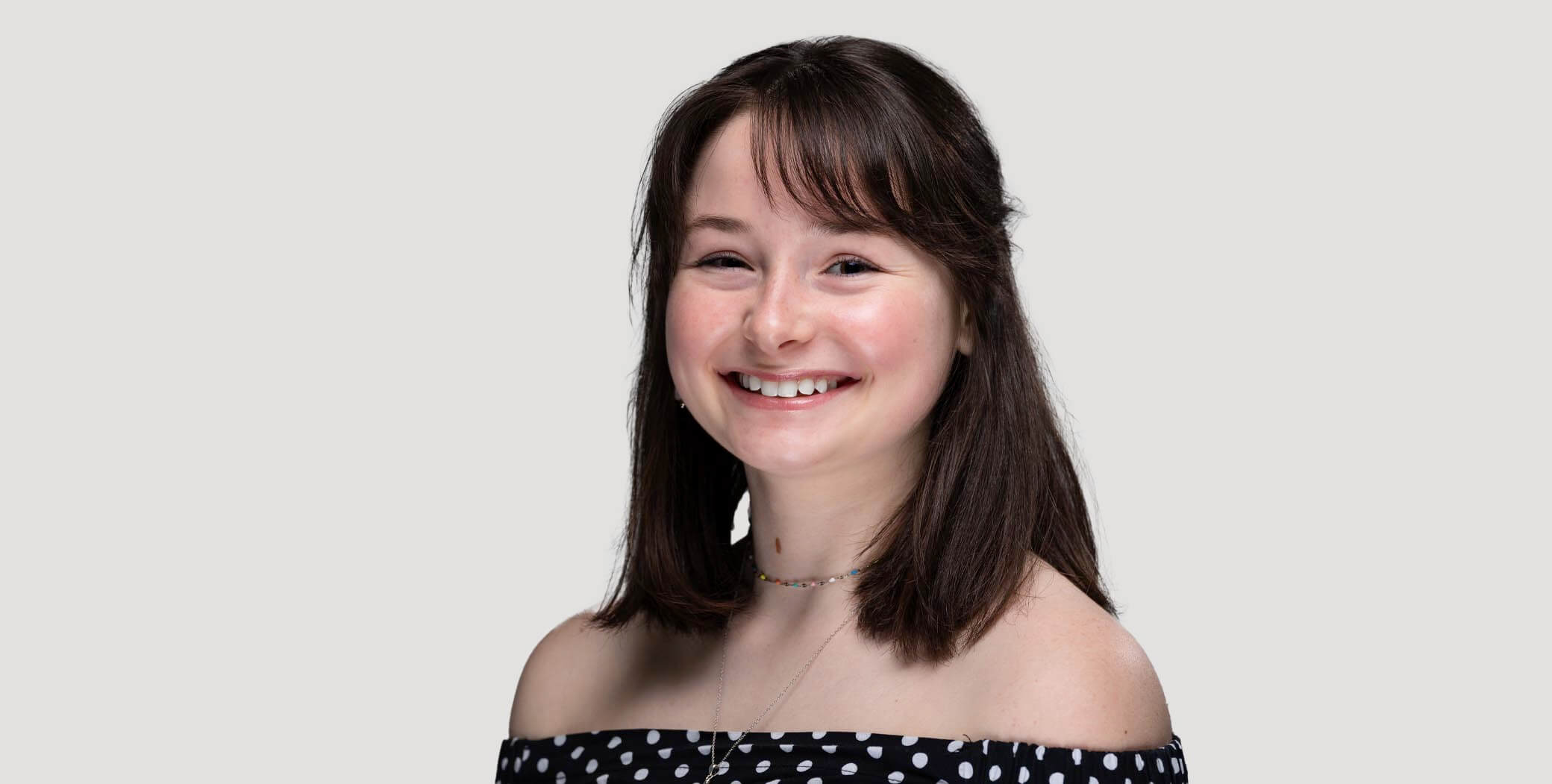
Meaghan “Meg” Caron
Valedictorian
College of Earth, Life, and Health Sciences | College of Liberal Arts and Sciences
Bachelor of Science in Microbiology with a Second Major in Molecular and Cellular Biology | Bachelor of Arts in French
Meg Caron of Bangor, Maine, is the 2025 valedictorian. She is pursuing dual degrees in French and microbiology with a second science major in molecular and cellular biology. Alongside research, volunteer work, campus clubs and cooking competitions, she has been a member of the Field Hockey and Women’s Cross Country teams. Caron emphasizes the value of time, striving to spend every minute in the pursuit of happiness.
Caron participated in science fairs as a middle school student and conducted research projects every year through the Bangor High School STEM Academy. Her intellectual curiosity and desire to contribute to society continued at the University of Maine, where she pursued research as a Maine Top Scholar. In her first year, she received a Center for Undergraduate Research summer fellowship for her project investigating how fungal peptides affect the virulence of C. albicans and presented it with the fluency and confidence of an upper-class student.
As a rising senior, Caron was a summer research fellow at the University of Michigan’s Moenter Lab, then returned during her senior year where she now works as a laboratory assistant. She is studying how stress induces suppression of the reproductive axis. In high school, stress in Caron’s life led her to developing an eating disorder that, as a result, suppressed her menstrual cycle. Over four years, limited treatment options for the condition encouraged her to pursue her own research. Not only did it fuel her passion for women’s health, but it also taught her that perfection doesn’t equal happiness. After graduation, she plans to write a book about her experiences and publish it in 2026 after hiking the Appalachian Trail.
Caron’s pursuit of science and language education has enabled her to touch others’ lives in a meaningful way. She studied abroad in Nimes, France, to research co-infections with the support of a Pioneer Award from Phi Kappa Phi, of which she is now the undergraduate student representative on the national board of directors. Her research in Nimes, and later in Montreal through the Killam Fellowships Program, doubled as a linguistic and cultural immersion. Inspired by her family’s French Canadian heritage, becoming bilingual was a way for Caron to expand the scope of people with whom she can form relationships. It’s the French word “éphémère” that she’s realized life to be, thus she has devoted her time to impact others through research, communication and the contagion of joy.
In addition to hiking the Appalachian Trail and finalizing her book, Caron plans to apply to MD-Ph.D. programs after she graduates and specialize in women’s reproductive health as a physician and clinical researcher.
My name is Meaghan Caron.
Everyone at UMaine knows me as Meg.
I have three majors. One is microbiology, the second is molecular and cellular biology, and the third is French.
I’m from Bangor, Maine, and I’m your 2025 valedictorian.
A lot of people are confused by my pursuit of microbiology and neuroscience and women’s health alongside French studies, and I don’t know how that will align in my future, but I have a dream that I hope to pursue where I fulfill all of these passions.
The funny thing is that I already have a 10-year plan at least.
So, after the book, after hiking the Appalachian Trail, I’ll be doing an M.D. Ph.D., which is an eight year feat, a joyous feat.
And I eventually have a dream to open a restaurant.
That’s my kind of retirement plan.
So that’s way longer than a 10-year plan, but that’s what’s next on my agenda. When I look back at my time at UMaine, I see visions of so many different families that I’ve made on campus from the field hockey team, from the cross country team, to my nerd friends in class, to people in the climbing gymand my labs that I’ve been a part of.
I think the part that I’m going to miss the most is being within those families and getting to see these faces every single day, getting to be in the library at midnight, laughing so hard because we’re delirious from the amount of studying that we had to do.
The individuals that make up this university are definitely the ones that make it so wonderful, and they will be missed the most.
To the Class of 2025 graduates, congratulations and enjoy every bit of your next chapter.
And for the ones who have yet to graduate, good luck and make sure to enjoy your UMaine experience to the fullest.
I wish you the best.
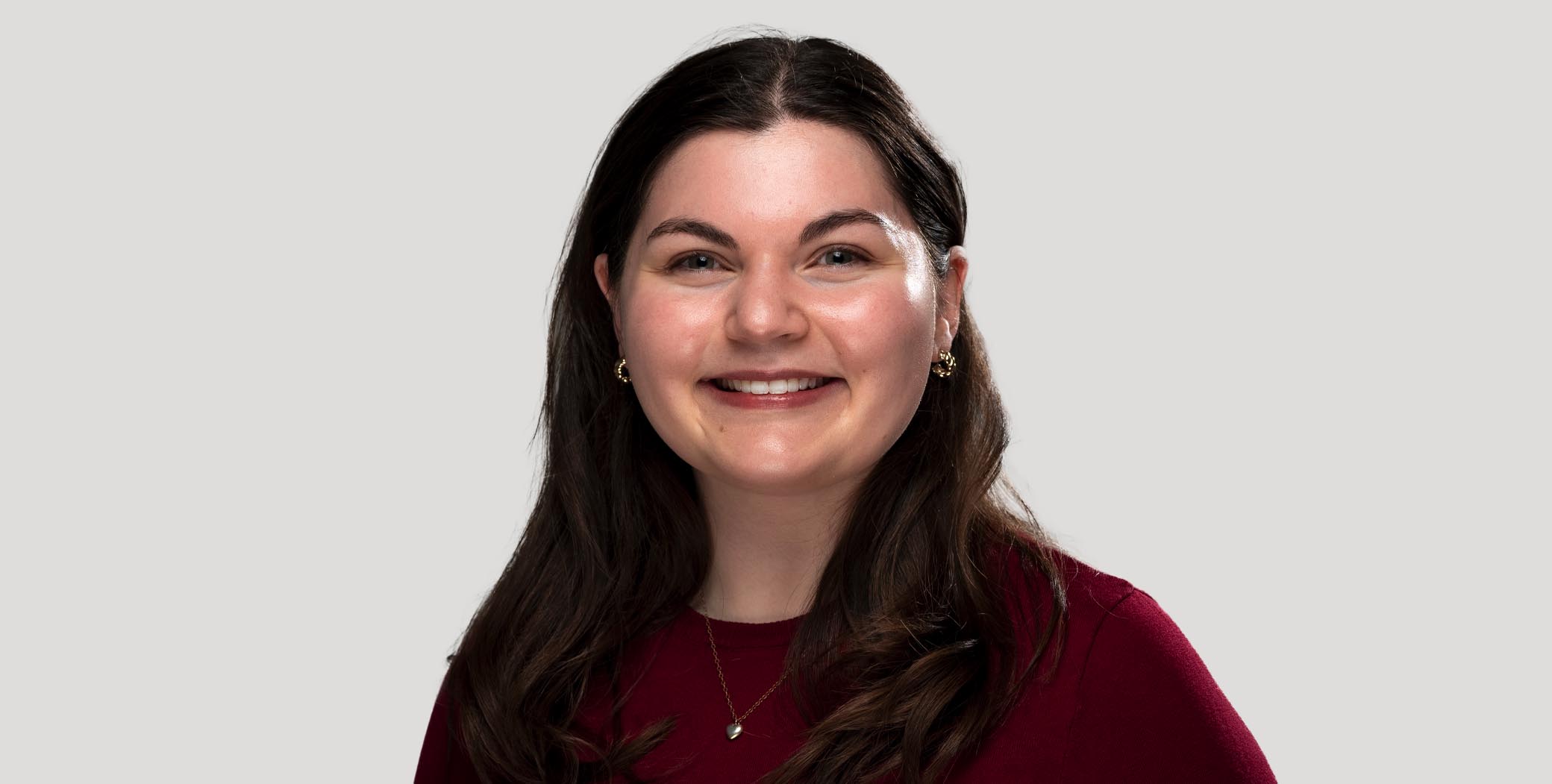
Alexandria Banou Morgan
Co-Salutatorian
College of Liberal Arts and Sciences | Honors College
Bachelor of Arts in Psychology with Minors in Neuroscience and Philosophy
Alexandria Banou Morgan of Perry, Maine, is a 2025 co-salutatorian and the outstanding graduating student in the Honors College and the College of Liberal Arts and Sciences (CLAS). She is majoring in psychology with minors in neuroscience and philosophy. Her journey at the University of Maine has been one of self discovery through scholarly pursuits and service.
Morgan applied her research on identity, religion and prejudice to help others find where they belong. At UMaine’s Culture, Religion, Attitudes and Beliefs Lab, of which she has been the undergraduate director since 2022, she studied the prejudices that impact minority groups. With support from a McGillicuddy Humanities Center Undergraduate Fellowship and Center of Undergraduate Research Summer Fellowship, she interviewed second generation Iranian American immigrants to better understand how holding multiple identities affects well-being and learned about herself through the process. She hoped to find other Iranian Americans, like herself, at UMaine who could relate to her experiences. What she found instead was that all people, regardless of ethnicity, race or religion, desire to be seen and understood, and they can find belonging with each other through their differences.
A Maine Top Scholar, Morgan secured approximately $63,000 in funding for her undergraduate research. She successfully defended her honors thesis titled “Religious Self Identity and Racism” 18 months early with support from the CLAS Undergraduate Research and Creative Activity Fellowship. She later co-presented her research on how white Christian nationalism promotes prejudice toward Black Americans at the International Association for the Psychology of Religion conference in the Netherlands and presented it at the 2024 UMaine Student Symposium, where she won the Social Sciences and Humanities category.
As part of her work with UMaine’s Clinical Child and Adolescent Psychology Lab, Morgan mentored two high school students who were participating in the Maine State Science Fair, an opportunity that brought her full circle back to the experience that awarded her a full tuition scholarship to attend UMaine. By flipping roles from student to mentor, she applied and repackaged the knowledge she’s gained since high school.
Through the Honors College, Morgan mentored peers and served as a teaching assistant for five courses. She was also a member of the clubs Women in Philosophy and Philosophy Across the Ages, in which she mentored high school students, fostering a passion for academia.
Following graduation, Morgan plans to research and advocate for state policy to bridge the inequality gap in Maine’s rural healthcare, then pursue a doctorate degree in clinical psychology.
Hello, my name is Alex Morgan.
I am a psychology major from Perry, Maine, and I’m your 2025 salutatorian.
Maine has a pretty big shortage of psychologists, psychiatrists, and so many other vital physicians.
And especially growing up in rural Maine, I really noticed this.
So I would love to come back to Maine one day and be a psychologist here.
But I think first, there are so many structural barriers to how people receive care.
That that’s kind of where I would want to start first and find ways to mitigate those barriers for Mainers.
I think a good mark of a mentor is someone who cares about you both in me academic sense, but also in how you’re doing personally.
And one of my mentors, Dr. Jordan LaBouff, had once reminded me during a time of, like, personal struggle, but also global struggle, that it’s important to remain vulnerable and open to new experiences from life; to remain soft to all the the world has to offer.
And that’s been something that I think about regularly.
Every year, I get to volunteer at the Special Olympics, which is inspired by my brother, who is also a local Special Olympian himself.
I find that like getting to have a real-world experience really enriches my psychology education.
I think you can learn so much in the classroom, but I think a lot of real-world learning begins outside, with other people.
I knit for different community specials like the Community Giving Tree and also my local hospital donation bins.
I can find ways to knit and crochet in between classes and just to de-stress.
It’s a good way to give back while also taking care of myself.
I think next for me, after UMaine, I’m going to take like a year off and maybe work in the field of psychology, and then eventually pursuing a doctorate in clinical psychology.
I think when I look back on my time at UMaine, I’m definitely going to miss the people and the community I built here.
I think that’s the thing I think about missing the most, looking forward, and something I’m already starting to miss now.
It feels very bittersweet to leave UMaine.
And I think a sign of a good education and good support is the readiness to leave.
But I do know that UMaine will always be home.

Dominic Needham
Co-Salutatorian
College of Earth, Life, and Health Sciences | Honors College
Bachelor of Science in Microbiology
Dominic Needham of Veazie, Maine, is a 2025 co-salutatorian. A microbiology major and member of the Honors College, Needham transferred to the University of Maine his sophomore year. His enthusiasm — drawn from a fascination in how invisible-to-the-eye pathogens can shape society — has remained steady and engaged through his education.
Leading into his senior year, Needham traveled to Senegal with UMaine’s Partners for World Health (PWH) chapter. A grant from Projects for Peace and UMaine’s Cohen Institute for Leadership & Public Service funded the trip for Needham and three other students. Over a week’s span, they helped 445 people from different parts of Senegal receive primary care from medical providers. They also helped interview and educate 200 pregnant women as an initiative by PWH to lower the infant and maternal mortality rates in sub-Saharan Africa, an experience that brought a sense of reality to Needham’s research on group B streptococcus (GBS) — a leading cause of newborn infectious disease with high rates in Africa.
A year of successive failures to create mutant strains of GBS taught Needham that research is more failure than success. Each failure was his motivation to try again with the determination that every next time would reveal the solution. He traces his skill and confidence in the laboratory back to “Phage Genome Discovery,” microbiology students’ first intensive research course. He returned as a teaching assistant during his junior and senior years and helped grow the skill and confidence of first-year students, like the course had done for him.
Needham’s honors thesis titled “Prophage-Driven Regulation of Nutrient Transport in Group B Streptococcus” was supported by the Maine INBRE Research Fellowship and Carolyn E. Reed Premedical Thesis Fellowship and presented at two UMaine Student Symposiums and two Maine Biological and Medical Sciences Symposiums.
In addition to his role as vice president and recycling coordinator for PWH, Needham is the president of the UMaine Health Professions Club, which he re-established during the COVID-19 pandemic to connect premedical students with each other and resources. He worked as a gross pathology intern at Dahl Chase Diagnostic Services between his sophomore and junior years. Since he was a rising sophomore, he has worked as an inpatient pharmacy tech at Northern Light Eastern Maine Medical Center, where he also volunteers his time through PWH.
Needham plans to specialize in infectious disease or pathology. He will take a gap year between graduation and medical school, and hopes to continue volunteering with organizations such as PWH.
Hi everyone.
My name is Dominic Needham.
I’m from Veazie, Maine, and I’m a microbiology major in the Honors College.
And I’m your Class of 2025 co-salutatorian.
The thing I’ll miss most is probably the community here. I came here in my second year as a transfer student.
I found, you know, the Molecular and Biomedical Sciences department.
Right from the go, I’m like, these are my people.
Just everybody is so supportive, all the time there.
Your classmates, the grad students, especially the faculty.
And seeing all of these people care about your success motivated me to do what I do.
As you might have guessed, I enjoy what I study, microbiology.
It’s always been really fascinating to me.
There’s these microbes everywhere.
They’re all over the ground; they’re all over your skin.
My first year here, I took a class called Phage, and, that was really fundamental in getting me involved in research.
Now I’ve TA’d that course for two years.
I kind of just wanted to replicate sort of the experience I got as a first-year and hopefully provide that to another student.
Help them find what they love.
I love volunteering because I’ve found a mission that I really believe in.
For the past couple of years with Partners for World Health, I’ve been able to save thousands of pounds of medical supplies from landfills.
I remember one of the first nights I volunteered I got this big trash bag, and I split open, and outpours just like all of this expensive equipment and devices and tools that would have all otherwise gone in the trash.
You have people who don’t have access to medical supplies, and, you know, you got a bunch of stuff over here and nothing over here.
Put them together, and stuff works out.
One piece of advice I’d have for anybody interested in the medical field is: to not box yourself in.
A lot of people will say, you know, you need to get this experience at this time, you know, check all these boxes.
And for me, college was a really cool time to instead explore what I want to do.
And there’s so many things that I would have never guessed that I would be able to do in college.
I never expected to be working with all these viruses and bacteria, working in a pathology lab, and and handling human tissues and organs.
So yeah, that’s my piece of advice: is explore your own interests. And don’t always listen to what people say.
I’ve had a lot of fun here over the last three years, but it’s time to move on.
It’s been my dream to be a physician for as long as I can remember.
And finally, this summer, I’ll be applying to med school.
And I’m really excited to see where that takes me.
Goodbye and good luck, Class of 2025.
And wherever you go, be proud to say that you’re from the University of Maine.
Outstanding Graduating Students

Siddhartha Bajracharya
Maine College of Engineering and Computing
Bachelor of Science in Computer Engineering
Siddhartha Bajracharya of Kathmandu, Nepal, is the Outstanding Graduating International Student in the Maine College of Engineering and Computing. A computer engineering major, Bajracharya discovered his passion for embedded systems, a specialized computer system combining hardware and software, through high-altitude ballooning workshops at the University of Maine and Montana State University. He collaborated with students and faculty from institutions across the country to design sensors and launch high-altitude balloons. These experiences expanded his technical skills and helped him build a nationwide network of peers and mentors. He plans to continue his academic journey by pursuing a master’s degree in computer engineering at UMaine.
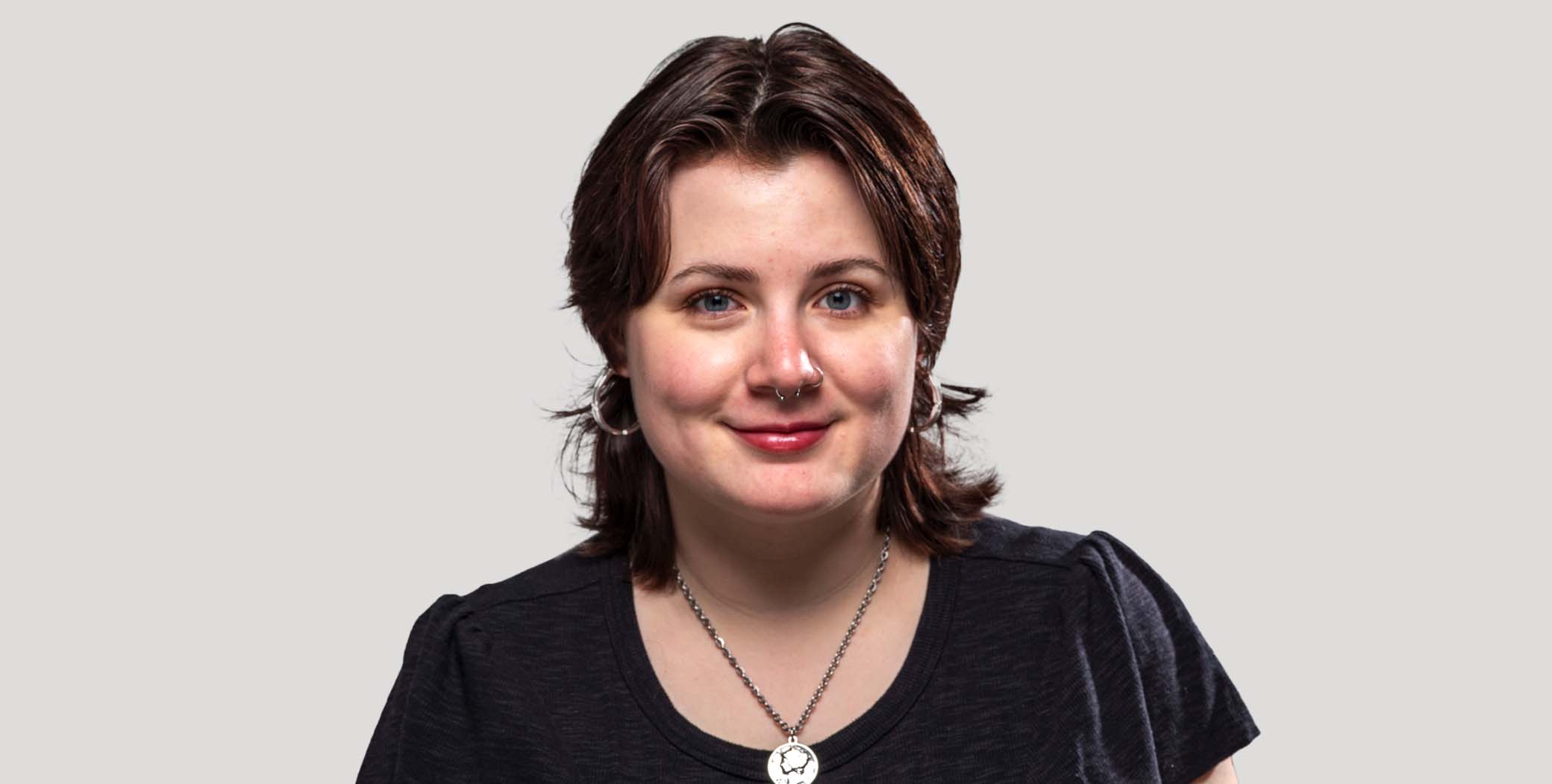
Morgan Elizabeth Bisecco
Maine Business School
Bachelor of Science in Business Administration in Finance with a Second Major in Management and a Minor in Economics
Morgan Bisecco from North Haven, Connecticut, is the Outstanding Graduating Student in the Maine Business School (MBS). She is majoring in business administration in finance with a second major in management and a minor in economics. She has been active in Beta Gamma Sigma and worked as an MBS ambassador and peer leader, as well as an undergraduate research assistant for the UMaine Advanced Structures and Composites Center (ASCC), all while participating in clubs including celtic dance and figure skating. A summer internship at Aetna Healthcare leading into her senior year exposed her to soft business skills such as professional etiquette, teamwork and networking. In fall 2024, she further developed her skills in time management, communication and leadership by working as a teaching assistant in a 300-level management course. She plans to continue her education in the Graduate School of Business while also working at the ASCC.
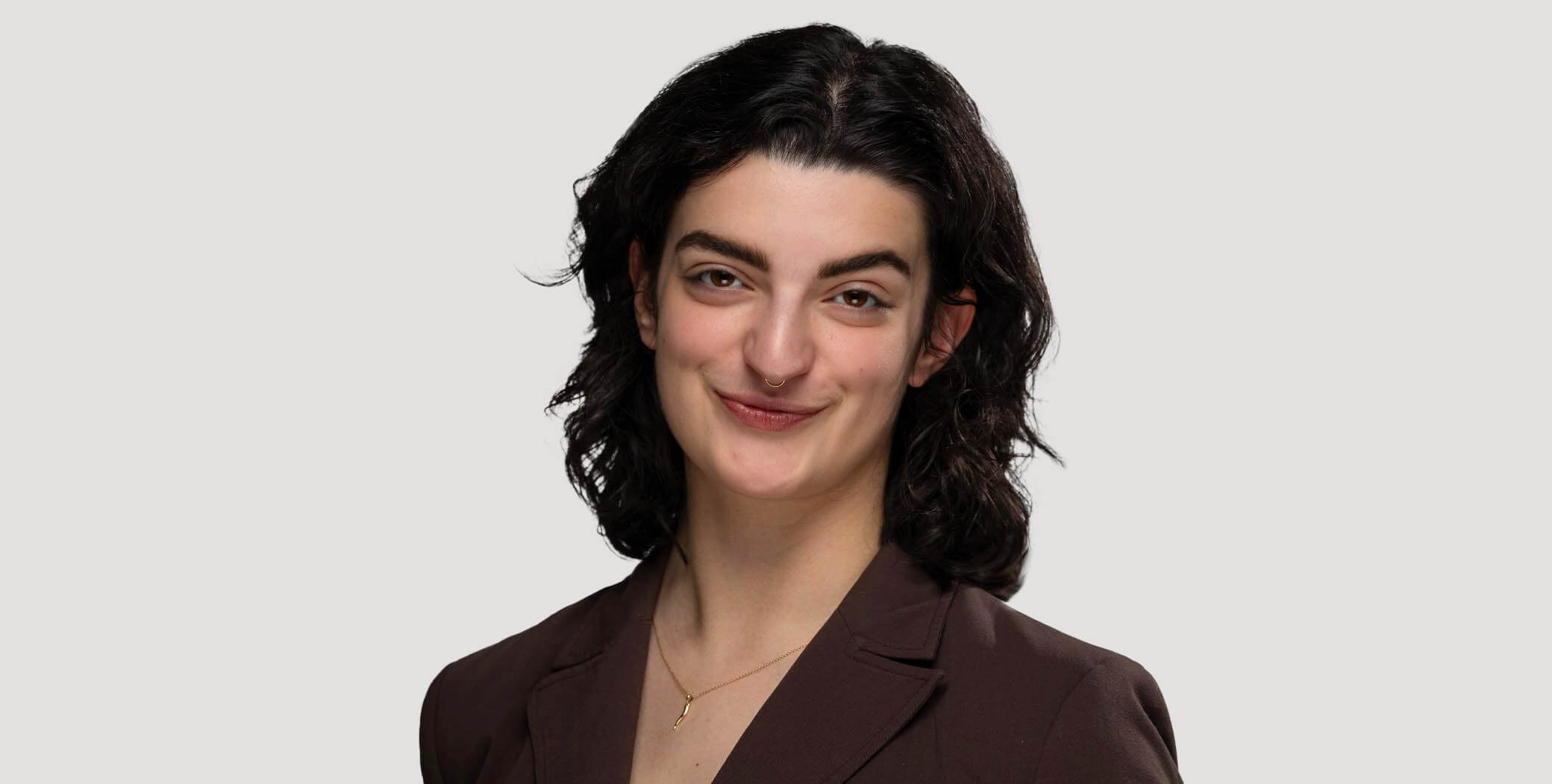
Elizabeth Brennan
College of Earth, Life, and Health Sciences
Bachelor of Science in Wildlife Ecology
Elizabeth Brennan of West Chester, Pennsylvania, is the Outstanding Graduating Student in the College of Earth, Life, and Health Sciences. She is a wildlife ecology major and member of the Honors College, through which she wrote a thesis titled “Phenological changes in Arctic and Common Terns across Maine’s coastal islands.” While attending the University of Maine, Brennan monitored and collected data on island seabirds for the U.S. Fish and Wildlife Service and performed abroad as a member of University Singers. After graduating, she plans to work as a shorebird steward in Massachusetts before pursuing her master’s in a wildlife-related field.

Daniela Chavez de Paz Solis
College of Earth, Life, and Health Sciences | Honors College
Bachelor of Science in Biology with a Concentration in Premedical Studies
Daniela Chavez de Paz Solis of Lima, Peru, is the Outstanding Graduating International Student in the Honors College. She is majoring in biology with a concentration in pre-medical sciences. Chavez’s experiences have connected her passions for science and service, beginning with her efforts to establish a chapter of the Maine Red Cross on the University of Maine’s campus. Her call to become a physician-scientist was further informed by her research collaboration with the University of Miami that has demonstrated the inequities in patient outcomes. Her honors thesis titled, “The Role of Inflammatory Mechanisms in Muscle Fiber Regeneration of Zebrafish Affected by Duchenne Muscular Dystrophy,” combined her knowledge of muscular development and immunology. Having strived to surround herself with people who motivate and challenge her — in and outside of the laboratory — Chavez competed and traveled with the Women’s Club Volleyball team. After graduating in May, she plans to use gap years to strengthen her skills and prepare for medical school.

Thomas Freel
Maine Business School
Bachelor of Science in Business Administration in Finance
Thomas Freel from Aberdeen, Scotland, is the Outstanding Graduating International Student for the Maine Business School. He is majoring in business administration in finance and is a member of the Men’s Ice Hockey team. His experience connected him with a group of fellow student athletes who motivated him and helped him grow as a teammate and person, as well as exposed him to situations that developed his skills in time management, group work and situational pressure. Through the university, he was also introduced to people and culture from all over the U.S. and experienced the unwavering commitment of UMaine hockey fans as his team claimed the Hockey East championship title in TD Garden in spring 2025 for the first time since 2004. Freel plans to continue playing hockey at UMaine while continuing his education at the Graduate School of Business.

Zachary J. Hopp
Maine College of Engineering and Computing
Bachelor of Science in Mechanical Engineering with a Minor in Mathematics
Zachary Hopp of Maple Grove, Minnesota, is the Outstanding Graduating Student in the Maine College of Engineering and Computing. A mechanical engineering major with a minor in mathematics, Hopp is also a member of the Men’s Swimming and Diving team. He has gained valuable experience in materials science by completing three internships in commercial HVAC, architectural glass and industrial abrasive systems manufacturing, as well as by conducting research on sustainable superhydrophobic coatings for food packaging. In addition to his degree, he earned a Composite Materials and Structures Certificate as an undergraduate. His time at UMaine has been shaped by interdisciplinary collaboration and mentorship, inspiring him to pursue a Ph.D. in materials science and engineering at Carnegie Mellon University to advance research in composite materials and polymers.
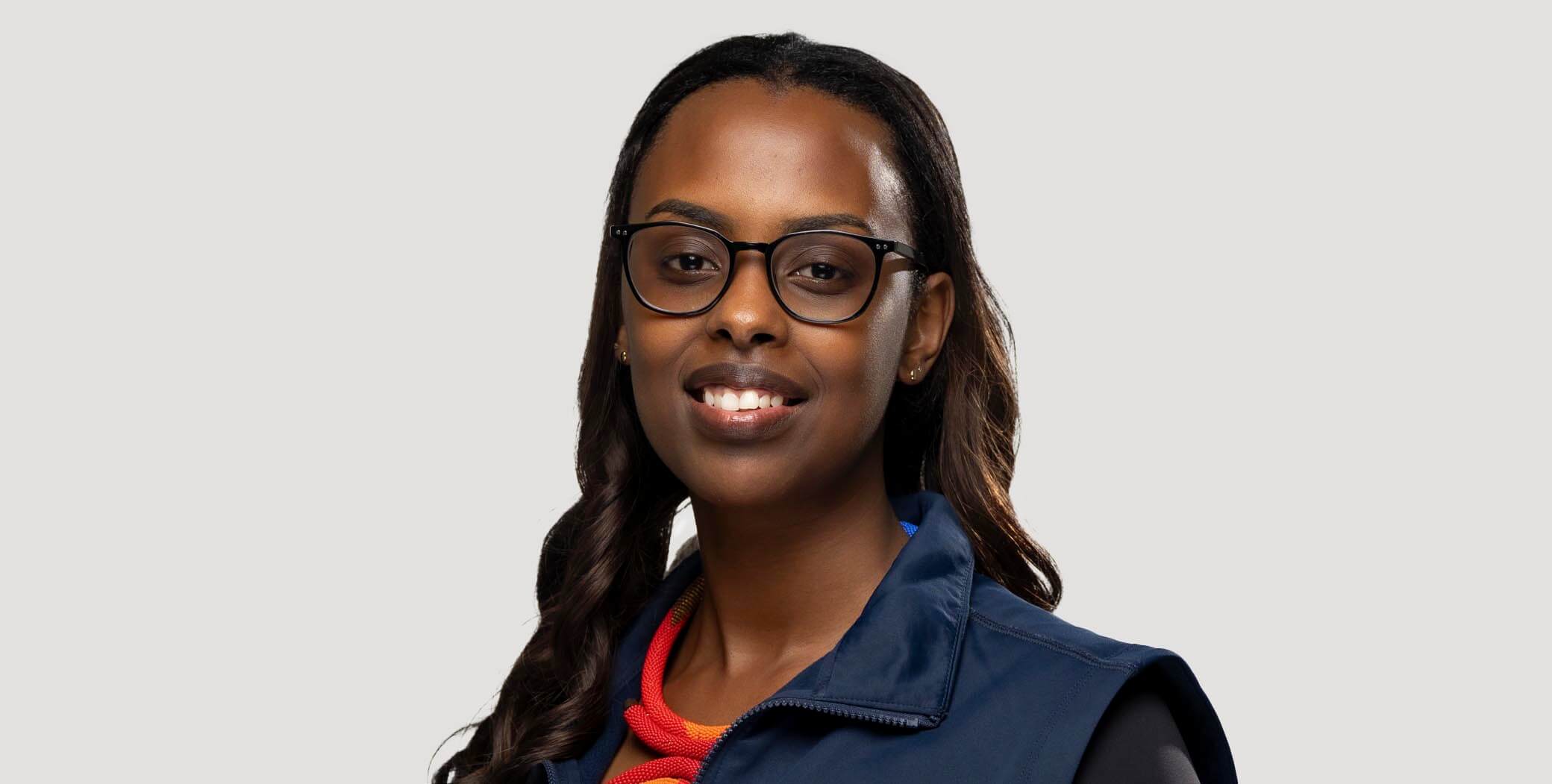
Amanda Ahava Karomba
Division of Lifelong Learning
Bachelor of University Studies with Minors in Interdisciplinary Disability Studies and Leadership Studies
Amanda Ahava Karomba of Lewiston, Maine, is the Outstanding Graduating Student in the Division of Lifelong Learning. She is majoring in university studies with minors in interdisciplinary disability studies and leadership studies. Karomba pursued her degree online while raising two boys and working as CEO of Happy Haven, an agency that provides direct support to adults with intellectual disabilities. UMaine offered Karomba, who is originally from Rwanda but raised in Maine, the flexibility to obtain a degree and allowed her to incorporate life and work experiences into her learning. After graduating, she plans to expand Happy Haven’s reach by offering a variety of services to underserved parts of the state, while mentoring and creating development opportunities for professionals like herself.
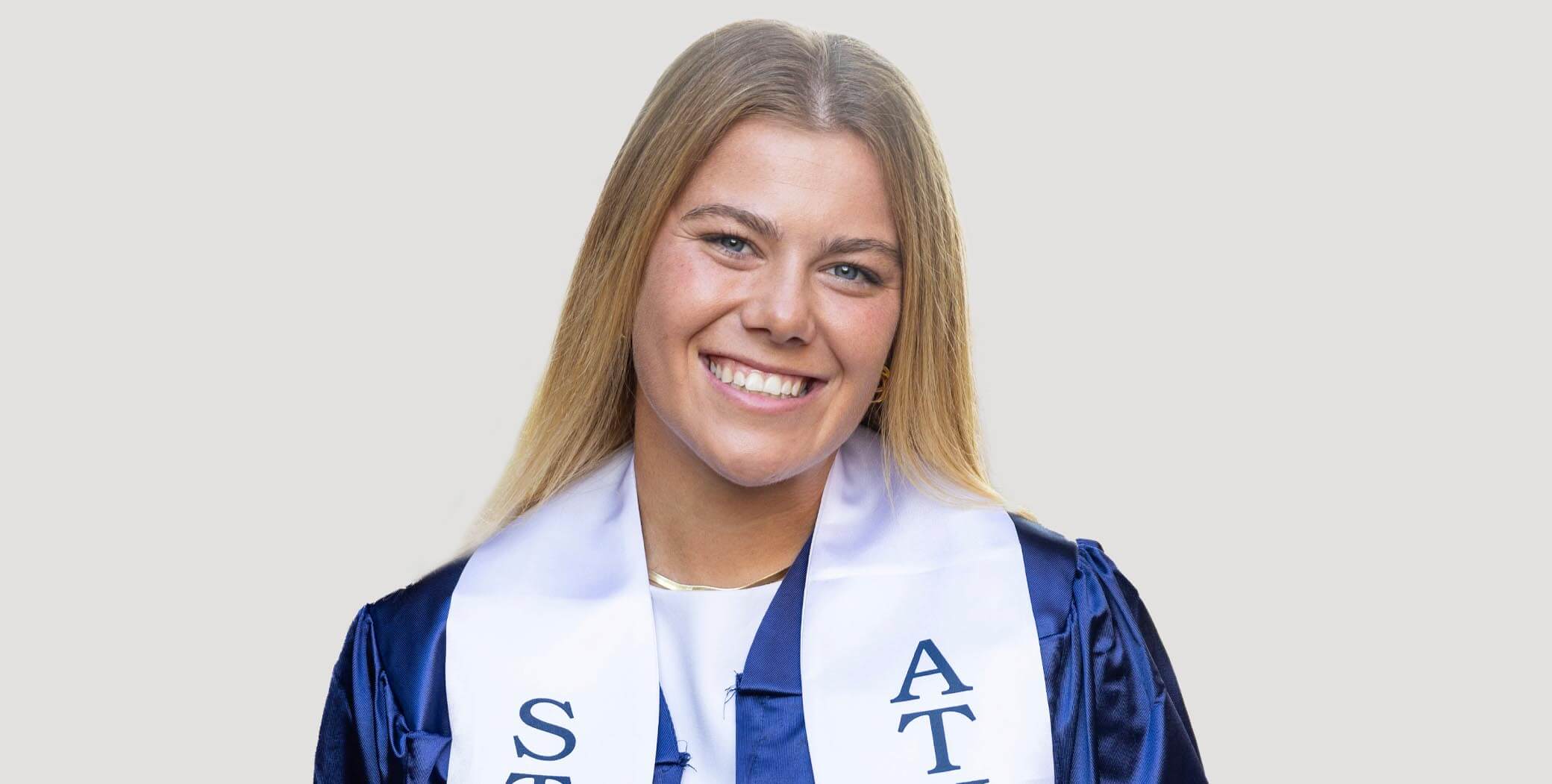
Lara Kirkby
College of Earth, Life, and Health Sciences
Bachelor of Science in Biochemistry
Lara Kirkby of Adelaide, South Australia, is the Outstanding Graduating International Student in the College of Earth, Life, and Health Sciences. A December 2024 graduate, Kirkby majored in biochemistry, researched in the Maginnis Lab and participated on the UMaine Women’s Soccer Team, through which she competed in and won two championships. After earning her bachelor’s degree a semester early, she joined the Adelaide United professional soccer team and is studying for medical school entrance exams.

Zachary Wentworth
College of Education and Human Development
Bachelor of Science in Secondary Education
Zachary Wentworth of Calais, Maine, is the Outstanding Graduating Student in the College of Education and Human Development (COEHD). He is a secondary education major with a concentration in social studies and a minor in history. A Maine Top Scholar, a Maine Seacoast Mission scholar and a Galen Cole Family Foundation scholar, Wentworth served as president of the University of Maine chapter of the Student Maine Education Association for the past two years. He was also an undergraduate resident assistant with Residence Life, working with the communities in Hart Hall in the 2023-24 academic year and in Hancock Hall this year. Wentworth completed his student teaching placement at Orono High School with mentor teacher Shana Goodall, a two-time alumna of COEHD and the 2019 Maine History Teacher of the Year. After graduating, Wentworth plans to pursue a master’s in student development in higher education at UMaine, while working as a graduate assistant in COEHD’s Advising Center.
5 Word Farewell
Hear the five important words our outstanding graduating students have to share with their peers.
Should I redo that?
Should I just say, like, the five words?
That’s it?
Oh. Then continue?
Okay. Sorry.
This is just, like, random?
Yeah. Okay, cool.
I was trying to remember what exactly was the next step.
My five-word farewell is:
We’ll take it from here.
Take care of each other.
Strive for success. Nothing less.
Keep exploring, helping, and growing.
Rêvez grand. Appréciez les petits.
Dream big. Appreciate the small.
Ramen’s been my best friend.
Maine has the best fans.
Wishing you strong Wi-Fi always.
Let Black Bear adventures begin.
Now graduates, but forever Black Bears.
Boom boom boom boom boom.
Doctoral Degree Candidates
Read about our doctoral degree candidates and their dissertations here.
Ceremony Music
Program to Be Selected From
Overture for Brass
by Fred Frank
Irish Tune from County Derry
by Percy Grainger
set by J. Kreines
The UMaine Medley
arr. Daniel Williams ’91, ’94G
The University of Maine Band by Joseph McCusker, ’17
O! Our Dear Alma Mater by Emma and William Chapman
For Maine! by Charles Bartlett, ’14
Napoli Celebration
by Harold Waters
Prelude and Caprice
by Frank Cofield
The Garden Song
by Dave Mallett, UMaine Honorary Doctorate, ’14
arr. Kim Kirkman
Amazing Grace
arr. Jari Villanueva
Battle Hymn of the Republic
by Willima Steefe and Julia Ward
arr. Peter Wilhousky
Fanfare for the Common Man
by Aaron Copland
Pomp and Circumstance
by Edward Elgar
arr. William S. Bartolotta
Stein Song
by Lincoln Colcord and EA Fenstad
arr. Lester Brockton
Musicians
University of Maine Ceremonial Brass Ensemble
Conductor
Philip Edelman
Trumpet
Ashton Kinney
James Murray
Jeffrey Nowack
Nicholas Sullivan
Joel Morin
Samuel Ivey
Horn
Braden Craig
Daniel Rumery
Isabelle Puccio
Marcelle James
Sophie Walton
Trombone
Colby Ellis
Connor Maurice
Leah Batoosingh
Tucker Wile
Zane Roggenbuck
Euphonium
Curtis Morgan
Jennifer Morin
Tuba
Amede Olise
Heath Kennedy
Percussion
Jason Trecartin
Hezekiah Agbuya
Owen Fitts
University of Maine Black Bear Men’s Chorus (Sunday)
Conductor
Daniel Williams
Accompanist
Ginger Hwalek
Tenor I
Zachary Croy
Roger Feeley
Zachary Fisher
John Thompson
Ben Wetzel
Tenor II
Nathan Brame
Dylan McFarland
Tom Poling
Tom White
Bass I
Shaun Dowd
Heath Kennedy
Jack Murray
Vaughn Simmons
Jameson Simpson
Bass II
Dave Baxter
George Deans
Ben McPhee
Kurt Schaller
Chris Shepley
Paul Wallace
Volunteers
University of Maine Commencement Committee co-chairs Scott Marzilli and Tom Peaco thank the many volunteers, including undergraduate ceremonies coordinator Dianne Avery and graduate ceremony coordinator Kathleen Harding-Heber who dedicated countless hours to the success of our university’s ceremonies.
Commencement Photography
PLEASE NOTE: In order to commemorate this milestone occasion, professional photographers will photograph each graduate receiving a diploma. To avoid congestion and to maintain decorum in the ceremony, we ask that family members and other guests refrain from approaching the stage to take pictures. Please remain seated until the end of the ceremony. We ask you to respect the importance of commencement to the University of Maine community and to those individuals being honored on this occasion.

